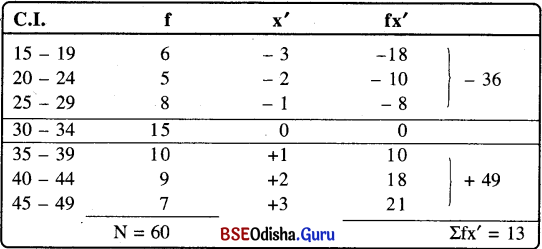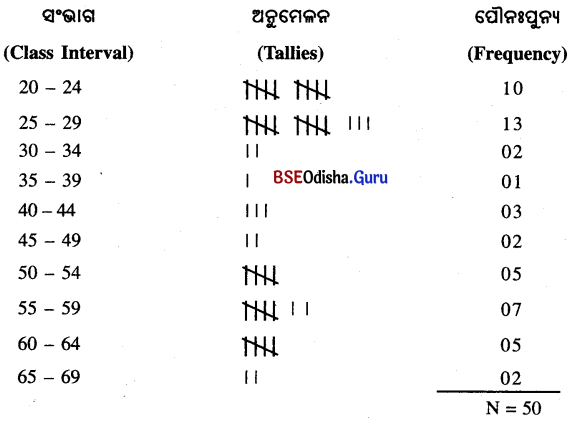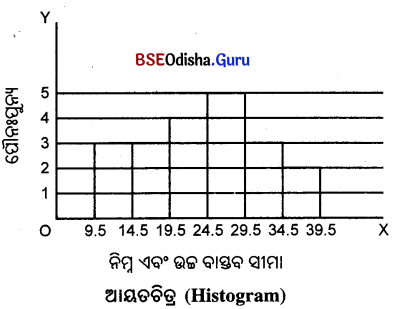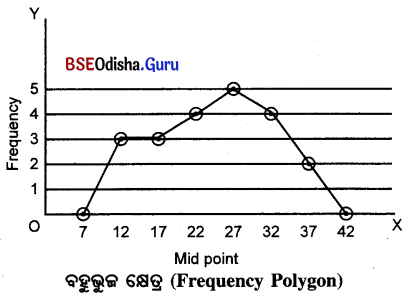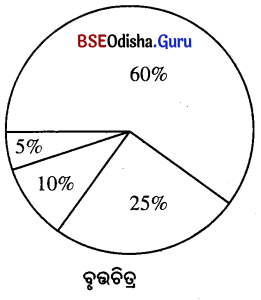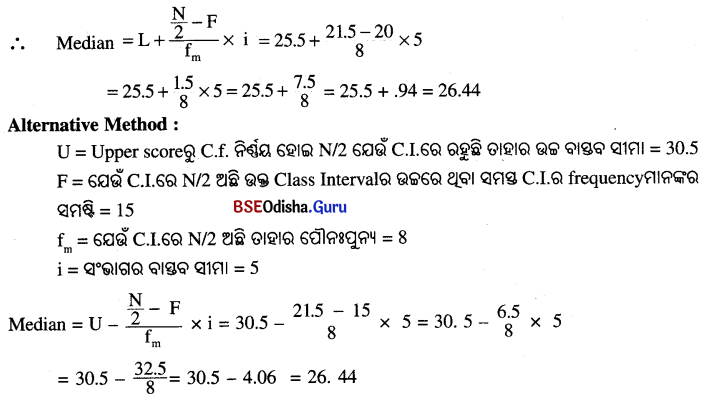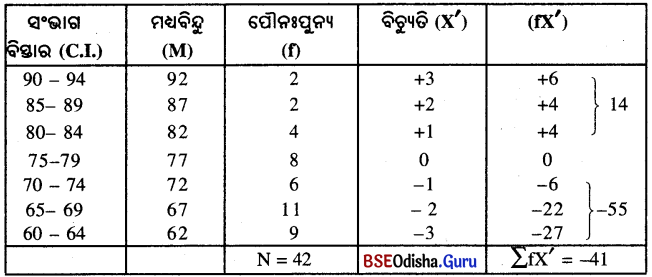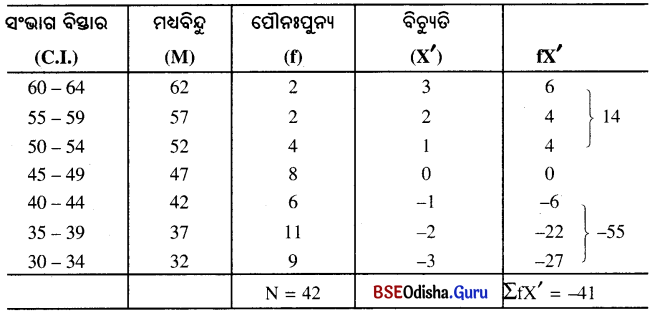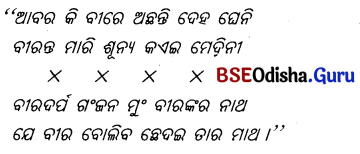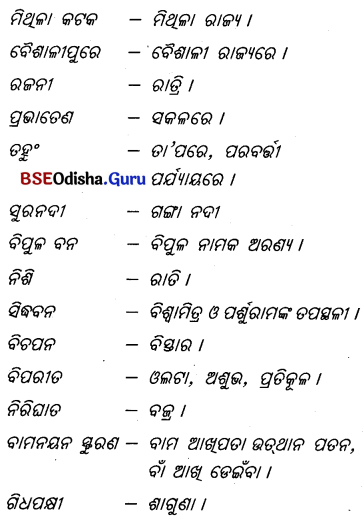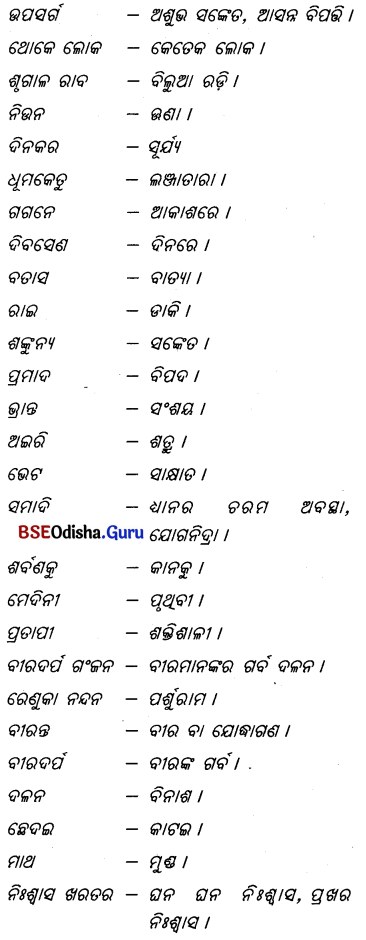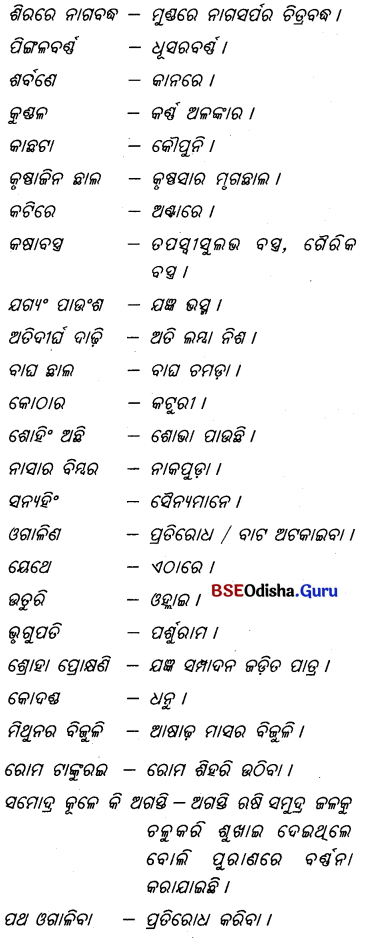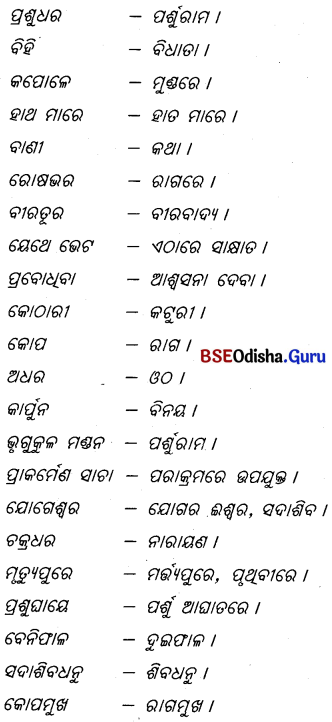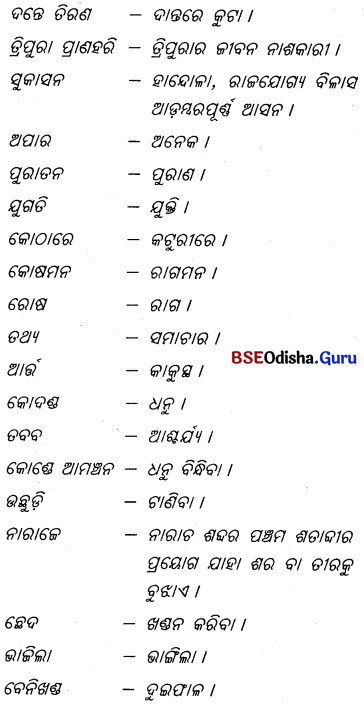Odisha State Board CHSE Odisha Class 12 Odia Solutions Chapter 7 ବନ୍ଦୀର ବିରହ ବ୍ୟଥା Textbook Exercise Questions and Answers.
CHSE Odisha Class 12 Odia Chapter 7 ବନ୍ଦୀର ବିରହ ବ୍ୟଥା Question Answer
ପାଠ୍ୟପୁସ୍ତକସ୍ଥ ପ୍ରଶ୍ନବଳୀର ଉତ୍ତର
(କ) ସଂକ୍ଷିପ୍ତ ଉତ୍ତରମୂଳକ ପ୍ରଶ୍ନ । ଚାରିଗୋଟି ସମ୍ଭାବ୍ୟ ଉତ୍ତର ମଧ୍ୟରୁ ଠିକ୍ ଉତ୍ତରଟି ବାଛି ଲେଖ । ପ୍ରଶ୍ନର ମୂଲ୍ୟ ୧ ନମ୍ବର ।
Question ୧ ।
‘ନାନାରଙ୍ଗ ଚନ୍ଦ୍ର ଆତପେ ଆଚ୍ଛାଦିତ ଅମ୍ବର’’, ଏଠାରେ ଅମ୍ବରର ଅର୍ଥ – _________।_
(i) ଲୁଗା
(ii) ଚାନ୍ଦୁଆ
(iii) ଆକାଶ
(iv) ସୂର୍ଯ୍ୟ
Answer:
(iii) ଆକାଶ
Question ୨ ।
ସୂର୍ଯ୍ୟାସ୍ତ ସମୟରେ ଗଛଗୁଡ଼ିକର ଛାଇ ଲମ୍ବି ଯାଇଥିବାରୁ କବି କ’ଣ କଳ୍ପନା କରୁଛନ୍ତି ?
(i) ଗଛମାନେ ଅନ୍ଧାରକୁ ଜାବୁଡ଼ି ଧରିଛନ୍ତି ।
(ii) ଗଛମାନେ ସୂର୍ଯ୍ୟଙ୍କ ପାଦରେ ପ୍ରଣାମ କରୁଛନ୍ତି ।
(iii) ଗଛମାନେ ଗର୍ବରେ ଫୁଲି ଉଠୁଛନ୍ତି ।
(iv) ପରାଧୀନତା ପରି ଅନ୍ଧକାର ବ୍ୟାପିଯାଉଛି ।
Answer:
(ii) ଗଛମାନେ ସୂର୍ଯ୍ୟଙ୍କ ପାଦରେ ପ୍ରଣାମ କରୁଛନ୍ତି ।
Question ୩ ।
ସୂର୍ଯ୍ୟାସ୍ତକାଳୀନ ମୃଦୁ ସମୀରଣକୁ କବି କାହା ସହିତ ତୁଳନା କରିଛନ୍ତି ?
(i) ପତିପତ୍ନୀର କଳହ
(ii) ପ୍ରେମ ଅସ୍ପଷ୍ଟ ଗିର
(iii) ନାୟକ ନାୟିକାର ମିଳନ
(iv) ପ୍ରେମିକର ଭର୍ସନା
Answer:
(ii) ପ୍ରେମ ଅସ୍ପଷ୍ଟ ଗିର
Question ୪ ।
ସନ୍ଧ୍ୟାକାଳୀନ ମୃଦୁ ସମୀରଣରେ ସୂର୍ଯ୍ୟ ପ୍ରେମିକାର କାନରେ କ’ଣ କହୁଥିଲେ ?
(i) ଶୀଘ୍ର ଫେରି ଆସିବି
(ii) ଆଉ ଫେରିବନି
(iii) ବିରହ ଅବିସମ୍ବାଦିତ
(iv) ଫେରିବାରେ ବିଳମ୍ବ ହେବ
Answer:
(i) ଶୀଘ୍ର ଫେରି ଆସିବି
Question ୫ ।
ଅନୁଭବୀର ନେତ୍ରରେ କ’ଣ ଦେଖାଯାଏ ?
(i) ପ୍ରେମିକାର ଲାସ୍ୟ
(ii) ପ୍ରେମିକାର ସ୍ଵୀକୃତି
(iii) ପ୍ରେମିକର ଆନନ୍ଦ ଭିତରେ ବିଷାଦ ରେଖା
(iv) ପ୍ରେମିକର ଅହଂକାର
Answer:
(iii) ପ୍ରେମିକର ଆନନ୍ଦ ଭିତରେ ବିଷାଦ ରେଖା
![]()
Question ୬ ।
ବନ୍ଦୀ ଗୋପବନ୍ଧୁଙ୍କ ପ୍ରାଣରେ କେଉଁ ଦୃଶ୍ୟ କଷ୍ଟ ଦେଉଥିଲା ?
(i) ଅନ୍ୟ ଜଣେ ବନ୍ଦୀ ପ୍ରତି ଅତ୍ୟାଚାର
(ii) ସନ୍ଧ୍ୟାର ବିରହ ଦୃଶ୍ୟ
(iii) ଅସ୍ତକାଳୀନ ସୂର୍ଯ୍ୟର ସ୍ନିଗ୍ଧ କିରଣ
(iv) ନୀଡ଼ବାହୁଡ଼ା ପକ୍ଷୀମାନଙ୍କ ଆଗମନର ଦୃଶ୍ୟ
Answer:
(ii) ସନ୍ଧ୍ୟାର ବିରହ ଦୃଶ୍ୟ
Question ୭ ।
ପ୍ରଣୟ ପୀୟୂଷରେ କ’ଣ ମିଶିଛି ?
(i) ମିଳନ ଅମୃତ
(ii) ବିରହର ବିଷ
(iii) ପ୍ରତିକ୍ରିୟାର ହଳାହଳ
(iv) ନିର୍ଯାତନାର କୁଟିଳତା
Answer:
(ii) ବିରହର ବିଷ
Question ୮ ।
କବିଙ୍କ ତାପିତ ଅନ୍ତରରେ କିପରି ସାମ୍ବନା ଆସିବ ବୋଲି ସେ ମନେ କରିଛନ୍ତି ?
(i) ଜେଲ ଭିତରେ ରହିଲେ
(ii) ମୁକ୍ତି ପାଇଗଲେ
(iii) ପ୍ରକୃତି ମଧ୍ୟରେ ସମହୃଦ ବେଦନା ଦେଖିଲେ
(iv) ସିପାହି ତାଙ୍କୁ ଜେଲ ଭିତରେ ଆବଦ୍ଧ ନ କଲେ
Answer:
(iii) ପ୍ରକୃତି ମଧ୍ୟରେ ସମହୃଦ ବେଦନା ଦେଖିଲେ
Question ୯।
ଗୋପବନ୍ଧୁଙ୍କ ଅବରୋଧର ସମୟ କ’ଣ ଥିଲା ?
(i) ସକାଳ
(ii) ମଧ୍ୟାହ୍ନ
(iii) ଗୋଧୂଳି କାଳ
(iv) ରାତ୍ରି
Answer:
(iii) ଗୋଧୂଳି କାଳ
Question ୧୦ ।
ଯମଦୂତ ବୋଲି କବି କାହାକୁ କହିଛନ୍ତି ?
(i) ଜେଲର ସିପାହିକୁ
(ii) ସହବନ୍ଦୀଙ୍କୁ
(iii) ଇଂରେଜ ଶାସକଙ୍କୁ
(iv) ଗଡ଼ଜାତ ରାଜାଙ୍କୁ
Answer:
(i) ଜେଲର ସିପାହିକୁ
(ଖ) ସଂକ୍ଷିପ୍ତ ଉତ୍ତରମୂଳକ ପ୍ରଶ୍ନ । ଗୋଟିଏ ବାକ୍ୟରେ ଉତ୍ତର ଲେଖ । ପ୍ରଶ୍ନର ମୂଲ୍ୟ ୧ ନମ୍ବର ।
Question ୧ ।
‘ବନ୍ଦୀର ବିରହ ବ୍ୟଥା’ କବିତା ଗୋପବନ୍ଧୁଙ୍କ କେଉଁ ସଂକଳନରୁ ଆସିଛି ?
Answer:
‘ବନ୍ଦୀର ବିରହ ବ୍ୟଥା’ କବିତା ଗୋପବନ୍ଧୁଙ୍କ ‘କାରାକବିତା’ ସଂକଳନରୁ ଆସିଛି ।
Question ୭ ।
ବସନ୍ତ ସମୟ କିପରି ?
Answer:
ବସନ୍ତ ସମୟ ମଧୁର ବା ଆମୋଦଦାୟକ ।
Question ୩ ।
ବିଦାୟ ସୂର୍ଯ୍ୟର ଆକାଶ କେଉଁଥରେ ଆଚ୍ଛାଦିତ ବୋଲି ଗୋପବନ୍ଧୁ କହିଛନ୍ତି ?
Answer:
ବିଦାୟ ସୂର୍ଯ୍ୟର ଆକାଶ ନାନାରଙ୍ଗର ଚନ୍ଦ୍ରାତପରେ ଆଚ୍ଛାଦିତ ବୋଲି ଗୋପବନ୍ଧୁ କହିଛନ୍ତି ।
Question ୪।
ବିଦାୟବେଳାରେ ପକ୍ଷୀମାନଙ୍କର ଗାନ କିପରି ଥିଲା ?
Answer:
ବିଦାୟବେଳାରେ ପକ୍ଷୀମାନଙ୍କର ଗାନ କରୁଣ ଥିଲା ।
Question ୫ ।
ଆସନ୍ନ ସନ୍ଧ୍ୟାରେ ତରୁ ଓ ଗିରିର ବିସ୍ତାରିତ ଛାୟା କାହା ପାଦରେ ପ୍ରଣାମ କରୁଥିଲେ ?
Answer:
ଆସନ୍ନ ସନ୍ଧ୍ୟାରେ ତରୁ ଓ ଗିରିର ବିସ୍ତାରିତ ଛାୟା ସୂର୍ଯ୍ୟଙ୍କ ପାଦରେ ପ୍ରଣାମ କରୁଥିଲେ ।
Question ୬ ।
ପ୍ରଣାମର ପ୍ରତିବଦଳରେ ସୂର୍ଯ୍ୟ ତରୁଗିରିଙ୍କୁ କ’ଣ ଦାନ କରୁଥିଲେ ?
Answer:
ପ୍ରଣାମର ପ୍ରତିବଦଳରେ ସୂର୍ଯ୍ୟ ସେମାନଙ୍କ ଶିରରେ ହେମବର୍ଣ୍ଣର ପାଟ ଦାନ କରୁଥିଲେ ।
Question ୭ ।
ସନ୍ଧ୍ୟାକାଳୀନ ସୂର୍ଯ୍ୟ କେଉଁଠି ବସି ହସୁଥିଲେ ବୋଲି କୁହାଯାଇଛି ?
Answer:
ସନ୍ଧ୍ୟାକାଳୀନ ସୂର୍ଯ୍ୟ ଅସ୍ତାଚଳ ଉପରେ ବସି ହସୁଥିଲେ ବୋଲି କୁହାଯାଇଛି ।
Question ୮ ।
ଅସ୍ତକାଳୀନ ସୂର୍ଯ୍ୟଙ୍କର କୋମଳ କିରଣକୁ କବି କାହା ସହିତ ତୁଳନା କରିଛନ୍ତି ?
Answer:
ଅସ୍ତକାଳୀନ ସୂର୍ଯ୍ୟଙ୍କର କୋମଳ କିରଣକୁ କବି କୋମଳ ଆଶ୍ୱାସନା ଓ ସ୍ନେହ ଆଦର ସହିତ ତୁଳନା କରିଛନ୍ତି ।
![]()
Question ୯ ।
ବିଦାୟବେଳାରେ ପ୍ରେମର ଅସ୍ପଷ୍ଟ ଭାଷା କିଏ ଉଚ୍ଚାରଣ କରୁଥିଲେ ?
Answer:
ବିଦାୟବେଳାରେ ପ୍ରେମରେ ଅସ୍ପଷ୍ଟ ଭାଷା : ସମୀରଣ କଣ୍ଠରେ ସୂର୍ଯ୍ୟ ଉଚ୍ଚାରଣ କରୁଥିଲେ ।
Question ୧୦ ।
ସମୀରଣ କଣ୍ଠରେ ସୂର୍ଯ୍ୟ ଦେବତାଙ୍କର ପ୍ରେମପୂର୍ଣ୍ଣ ଅସ୍ପଷ୍ଟ ଭାଷା କ’ଣ ଥିଲା
Answer:
ସମୀରଣ କଣ୍ଠରେ ସୂର୍ଯ୍ୟ ଦେବତାଙ୍କ ପ୍ରେମପୂର୍ଣ୍ଣ ଅସ୍ପଷ୍ଟ ଭାଷା ଥିଲା, ‘ଅଚିରେ ଫେରିବି ଧନି ! ନୁହ କାତର ।’
Question ୧୧ ।
ବିଦାୟକାଳୀନ ଅନୁରାଗର ରଙ୍ଗ କେଉଁଠି ପ୍ରକାଶ ପାଉଥିଲା ?
Answer:
ବିଦାୟକାଳୀନ ଅନୁରାଗର ରଙ୍ଗ ପ୍ରାଚୀ-କପୋଳେ ପ୍ରକାଶ ପାଉଥିଲା ।
Question ୧୨ ।
ସୂର୍ଯ୍ୟଙ୍କର ହସରେ କ’ଣ ପ୍ରକଟିତ ହେଉଥିଲା ?
Answer:
ସୂର୍ଯ୍ୟଙ୍କର ହସରେ ଗୁରୁ ବିଷାଦରେଖା ପ୍ରକଟିତ ହେଉଥିଲା ।
Question ୧୩ ।
ବିରହ ସୂର୍ଯ୍ୟଙ୍କର ବିଷାଦ କିଏ ଦେଖି ପାରୁଥିବେ ବୋଲି କବି କହିଛନ୍ତି ?
Answer:
ବିରହ ସୂର୍ଯ୍ୟଙ୍କର ବିଷାଦ ଅନୁଭବୀ ନେତ୍ର କେବଳ ଦେଖି ପାରୁଥିବେ ବୋଲି କବି କହିଛନ୍ତି ।
Question ୧୪ ।
କାହାର ବିରହ ମନରେ ଦାରୁଣ କଷଣ ଦିଏ ବୋଲି କୁହାଯାଇଛି ?
Answer:
ପ୍ରିୟଜନର ବିରହ ମନରେ ଦାରୁଣ କଷଣ ଦିଏ ବୋଲି କୁହାଯାଇଛି ।
Question ୧୫ ।
ପ୍ରୀତି ପାଶରେ କିଏ ବନ୍ଧା ବୋଲି କବି କହିଛନ୍ତି ?
Answer:
ଜଗତର ସମସ୍ତ ଜଡ଼ଠାରୁ ଚେତନ ପର୍ଯ୍ୟନ୍ତ ପ୍ରୀତି ପାଶରେ ବନ୍ଧା ବୋଲି କବି କହିଛନ୍ତି ।
Question ୧୬ ।
ସୂର୍ଯ୍ୟଙ୍କର ବିରହ ଦୃଶ୍ୟ କାହା ପ୍ରାଣରେ ବ୍ୟଥା ଦେଉଥିଲା ?
Answer:
ସୂର୍ଯ୍ୟଙ୍କର ବିରହ ଦୃଶ୍ୟ ବନ୍ଦୀ ଗୋପବନ୍ଧୁଙ୍କ ପ୍ରାଣରେ ବ୍ୟଥା ଦେଉଥିଲା ।
Question ୧୭ ।
ସନ୍ଧ୍ୟାକାଳୀନ ବିଦାୟ ଦୃଶ୍ୟ ବନ୍ଦୀ ଗୋପବନ୍ଧୁଙ୍କୁ କ’ଣ ମନେ ପକାଇ ଦେଉଥିଲା ?
Answer:
ସନ୍ଧ୍ୟାକାଳୀନ ବିଦାୟ ଦୃଶ୍ୟ ବନ୍ଦୀ ଗୋପବନ୍ଧୁଙ୍କୁ ଅତୀତର କେତେକଥା ମନେପକାଇ ଦେଉଥିଲା ।
Question ୧୮ ।
ବନ୍ଦୀଶାଳାରେ ଚାବି ନ ଦେବାପାଇଁ ଗୋପବନ୍ଧୁ କାହାକୁ ଅନୁରୋଧ କରିଥିଲେ ?
Answer:
ବନ୍ଦୀଶାଳାରେ ଚାବି ନ ଦେବାପାଇଁ ଗୋପବନ୍ଧୁ ସିପାହିକୁ ଅନୁରୋଧ କରିଥିଲେ ।
Question ୧୯ ।
ଗୋପବନ୍ଧୁ ବନ୍ଦୀଶାଳାର ଚାବି ନ ଦେବାପାଇଁ ସିପାହିକୁ କାହିଁକି ଅନୁରୋଧ କରିଥିଲେ ?
Answer:
ପ୍ରକୃତିର ପ୍ରତ୍ୟେକ କ୍ଷେତ୍ରରେ ପ୍ରଣୟ ସହ ବିରହଜ୍ବାଳା ମିଶି ରହିଥିବାର ଦୃଶ୍ୟ ଉପଭୋଗ କରୁଥିବା ଗୋପବନ୍ଧୁ ଦେବାପାଇଁ ସିପାହୀକୁ ଅନୁରୋଧ କରିଥିଲେ ।
Question ୨୦ ।
ପ୍ରଣୟ ପୀୟୂଷରେ କ’ଣ ମିଶିଛି ବୋଲି କବି କହିଛନ୍ତି ?
Answer:
ପ୍ରଣୟ ପୀୟୂଷରେ ବିରହ ବିଷ ମିଶିଛି ବୋଲି କବି କହିଛନ୍ତି ।
Question ୨୧ ।
ବିଶ୍ବବାସୀଙ୍କ ପ୍ରତି ବିଧାତାର ବିଚିତ୍ର ଆଶିଷ ବୋଲି କବି କାହାକୁ କହିଛନ୍ତି ?
Answer:
ପ୍ରଣୟ ପୀୟୂଷରେ ବିରହ ବିଷ ମିଶିରହିଥିବା ବିଶ୍ବବାସୀଙ୍କ ପ୍ରତି ବିଧାତାର ବିଚିତ୍ର ଆଶିଷ ବୋଲି କବି କହିଛନ୍ତି ।
Question ୨୨ ।
ସୁନ୍ଦର ପଦ୍ମରେ କିଏ ଜଡ଼ିତ ହୋଇଥାଏ ବୋଲି କୁହାଯାଇଛି ?
Answer:
ସୁନ୍ଦର ପଦ୍ମରେ ଅହି ଜଡ଼ିତ ହୋଇଥାଏ ବୋଲି କୁହାଯାଇଛି ।
Question ୨୩ ।
ବିରହକୁ କବି କାହା ସହିତ ତୁଳନା କରିଛନ୍ତି ?
Answer:
ବିରହକୁ କବି ବିଷ ସହିତ ତୁଳନା କରିଛନ୍ତି ।
Question ୨୪ ।
କେଉଁ ବିଷରେ କବିଙ୍କ ପରାଣ ଘାରୁଛି ବୋଲି ସେ କହିଛନ୍ତି ?
Answer:
ବିରହ-ବିଷମ ବିଷରେ କବିଙ୍କ ପରାଣ ଘାରୁଛି ବୋଲି ସେ କହିଛନ୍ତି ।
Question ୨୫ ।
ଆପଣାର ବିରହ ବେଦନାକୁ କବି କେଉଁଠାରେ ଦେଖିଛନ୍ତି ?
Answer:
ଆପଣାର ବିରହ ବେଦନାକୁ କବି ବିଶ୍ଵ ପ୍ରକୃତିରେ ଦେଖିଛନ୍ତି ।
Question ୨୬ ।
କବିଙ୍କ ତାପିତ ଅନ୍ତର କିପରି ସାନ୍ତନା ଲାଭ କରିଛି ?
Answer:
ବିଶ୍ଵ ପ୍ରକୃତିରେ ସମାନ ହୃଦବେଦନା ଦେଖି କବିଙ୍କ ତାପିତ ଅନ୍ତର ସାନ୍ତନା ଲାଭ କରିଛି ।
Question ୨୭ ।
ବନ୍ଦୀଶାଳାର ଅବରୋଧ ସମୟ କେଉଁ ସମୟ ଥିଲା ?
Answer:
ବନ୍ଦୀଶାଳାର ଅବରୋଧର ସମୟ ଗୋଧୂଳି କାଳ ଥିଲା ।
![]()
Question ୨୮ ।
ସୂର୍ଯ୍ୟ ଆକାଶରେ ରତରତ ହେଉଥିବାରୁ କବି ସିପାହିକୁ କ’ଣ ଅନୁରୋଧ କରିଛନ୍ତି ?
Answer:
ସୂର୍ଯ୍ୟ ଆକାଶରେ ରତରତ ହେଉଥିବାରୁ କବି ସିପାହିକୁ ଆଉଟିକିଏ କାରାପ୍ରାଙ୍ଗଣରେ ବୁଲିବାକୁ ଅନୁରୋଧ କରିଛନ୍ତି ।
Question ୨୯ ।
ଯମଦୂତ ବୋଲି କବି କାହାକୁ କହୁଛନ୍ତି ?
Answer:
ବନ୍ଦୀଶାଳାର ସିପାହିକୁ ଯମଦୂତ ବୋଲି କବି କହିଛନ୍ତି ।
Question ୩୦ ।
ନିଜର ମର୍ଯ୍ୟାଦା ଜଗି ଶେଷରେ କବି କ’ଣ କରିବେ ବୋଲି କହିଛନ୍ତି ?
Answer:
ନିଜର ମର୍ଯ୍ୟାଦା ଜଗି ଶେଷରେ କବି ନିଜ ଛୋଟ କୋଠରିକୁ ଯିବେ ବୋଲି କହିଛନ୍ତି ।
(ଗ) ସଂକ୍ଷିପ୍ତ ଉତ୍ତରମୂଳକ ପ୍ରଶ୍ନ । ଦୁଇଟି ବାକ୍ୟରେ ଉତ୍ତର ଲେଖ । ଲେଖା ଓ ଲେଖକଙ୍କ ପାଇଁ ୧ ନମ୍ବର ଏବଂ ଉତ୍ତର ପାଇଁ ୧ ନମ୍ବର ରହିବ । ପ୍ରଶ୍ନର ମୂଲ୍ୟ ୨ ନମ୍ବର ।
କବିତା – ବନ୍ଦୀର ବିରହ ବ୍ୟଥା, କବି – ଗୋପବନ୍ଧୁ ଦାସ
Question ୧ ।
‘ବନ୍ଦୀର ବିରହ ବ୍ୟଥା’’ କବିତା ଗୋପବନ୍ଧୁ କେଉଁ ଜେଲ୍ରେ ଥିବାବେଳେ ଲେଖିଥିଲେ ?
Answer:
‘‘ବନ୍ଦୀର ବିରହ ବ୍ୟଥା’’ କବିତା କବି ଗୋପବନ୍ଧୁ ଦାସ ୧୯୨୩-୨୪ ମସିହାରେ ହଜାରିବାଗ ଜେଲ୍ରେ ଥିବାବେଳେ ଲେଖିଥିଲେ । ଏଥିରେ କବି ଅସ୍ତଗାମୀ ସୂର୍ଯ୍ୟଙ୍କୁ ଦେଖି ପ୍ରକୃତିର ବିରହ ପ୍ରସଙ୍ଗ ବିଷୟରେ ବର୍ଣ୍ଣନା କରିଛନ୍ତି ।
Question ୨ ।
ସୂର୍ଯ୍ୟଙ୍କର ବିଦାୟକାଳୀନ ଦୃଶ୍ୟ କିପରି ଥିଲା ?
Answer:
ସୂର୍ଯ୍ୟଙ୍କର ବିଦାୟକାଳୀନ ଦୃଶ୍ୟ ଅତି ମନୋରମ, ଯାହାକୁ କବି ଅମ୍ବରରେ ନାନାରଙ୍ଗର ଚନ୍ଦ୍ରାତପ ଆଚ୍ଛାଦିତ ହୋଇଛି ବୋଲି କହିଛନ୍ତି ।
Question ୩ ।
ସନ୍ଧ୍ୟାକାଳୀନ ତରୁଗିରର ବିସ୍ତାରିତ ଛାୟାକୁ କବି କାହା ସହିତ ତୁଳନା କରିଛନ୍ତି ?
Answer:
ସନ୍ଧ୍ୟାକାଳୀନ ତରୁଗିରିର ବିସ୍ତାରିତ ଛାୟାକୁ କବି ଅସ୍ତଗାମୀ ସୂର୍ଯ୍ୟଙ୍କ ପାଦରେ ପ୍ରଣାମ କରିବା ସହିତ ତୁଳନା କରିଛନ୍ତି ।
Question ୪ ।
‘‘ ଅଚିରେ ଫେରିବି ଧନି ! ନୁହ କାତର’’ – କିଏ କାହାକୁ କହିଛନ୍ତି ?
Answer:
‘ଅଚିରେ ଫେରିବି ଧନି ! ନୁହ କାତର’ – ଏହା ଅସ୍ତଗାମୀ ସୂର୍ଯ୍ୟ ପୃଥିବୀକୁ କହିଛନ୍ତି ବୋଲି କବି ପରିକଳ୍ପନା
Question ୫ ।
ସନ୍ଧ୍ୟାର ଅନୁରାଗ ରଙ୍ଗରେ ବିରହ ଦୁଃଖର କାଳିମା କିପରି ଥିଲା ?
Answer:
ସନ୍ଧ୍ୟାର ଅନୁରାଗ ରଙ୍ଗରେ ବିରହ ଦୁଃଖର କାଳିମା ହେଉଛି, ସୂର୍ଯ୍ୟ ପ୍ରାଚୀ-କପୋଳରେ ଅନୁରାଗ ରଙ୍ଗ ବୋଳି ଦେଉଥିଲାବେଳେ, ସନ୍ଧ୍ୟାର କ୍ରମଶଃ କାଳିମାକୁ ବିରହ ଦୁଃଖର କାଳିମା ବୋଲି କବି ପରିକଳ୍ପନା କରିଛନ୍ତି ।
Question ୬ ।
ସନ୍ଧ୍ୟାକାଳୀନ ଦୃଶ୍ୟରୁ ଅନୁଭବୀ ବ୍ୟକ୍ତି କ’ଣ ଦେଖିପାରେ ?
Answer:
ସନ୍ଧ୍ୟାକାଳୀନ ଦୃଶ୍ୟରୁ ଅନୁଭବୀ ବ୍ୟକ୍ତି, ପ୍ରିୟଜନ ବିରହର ଦାରୁଣ କଷଣକୁ ଦେଖିପାରେ ।
Question ୭ ।
ପ୍ରିୟଜନର ବିରହ ଦୁଃଖ କବିଙ୍କୁ କିପରି ମନେ ହେଉଛି ?
Answer:
ପ୍ରିୟଜନର ବିରହ ଦୁଃଖ ଅତ୍ୟନ୍ତ କଷ୍ଟଦାୟକ ଯାହାକୁ କବି ଦାରୁଣ କଷଣ ବୋଲି କହିଛନ୍ତି ।
Question ୮ ।
ପ୍ରୀତି ପାଶରେ କିଏ ବନ୍ଧା ହୋଇଛନ୍ତି ବୋଲି କବି ଗୋପବନ୍ଧୁ କହିଛନ୍ତି ?
Answer:
ଜଡ଼ରୁ ଚେତନ ପର୍ଯ୍ୟନ୍ତ ସମସ୍ତେ ପ୍ରୀତି ପାଶରେ ବନ୍ଧା ହୋଇଛନ୍ତି, ଯାହା ଫଳରେ ପ୍ରିୟଜନର ବିରହରେ ସମସ୍ତେ ଦାରୁଣ କଷଣ ଭୋଗ କରିଥା’ନ୍ତି ବୋଲି କବି ଗୋପବନ୍ଧୁ କହିଛନ୍ତି ।
Question ୯ ।
ସିପାହିକୁ କବି କାହିଁକି ବନ୍ଦୀଶାଳାର ଦ୍ଵାରରେ ଚାବି ନ ଦେବାପାଇଁ ଅନୁରୋଧ କରିଥିଲେ ?
Answer:
ପ୍ରକୃତି ରାଜ୍ୟରେ ପ୍ରଣୟର ପ୍ରଭାବକୁ ବାହାରେ ରହି ଆଉ ଟିକିଏ ଦେଖିବାପାଇଁ କବି ସିପାହିକୁ ବନ୍ଦୀଶାଳାର ଦ୍ଵାରରେ ଚାବି ନଦେବାପାଇଁ ଅନୁରୋଧ କରିଥିଲେ ।
Question ୧୦ ।
ପ୍ରଣୟର କି ବିଚିତ୍ର ବିଧାନ କବି ଉପଲବ୍ଧି କରିଛନ୍ତି ?
Answer:
ପ୍ରଣୟ ପୀୟୂଷରେ ବିରହବିଷ ମିଶିରହିଥିବା, ବିଶ୍ବବାସୀଙ୍କ ପ୍ରତି ବିଧାତାର ବିଚିତ୍ର ବିଧାନ କବି ଉପଲବ୍ଧି କରିଛନ୍ତି ।
Question ୧୧ ।
କବି ଗୋପବନ୍ଧୁଙ୍କ ମନପ୍ରାଣ କାହିଁକି ବିରହ ବିଷାଦରେ ଘାରୁଥିଲା ?
Answer:
ଯେହେତୁ କବି ଗୋପବନ୍ଧୁ ପ୍ରିୟଜନ ଓ ପ୍ରିୟସ୍ଥାନ ଛାଡ଼ି ବନ୍ଦୀଭାବରେ ରହିଥିଲେ, ସେଥିପାଇଁ ତାଙ୍କର ମନପ୍ରାଣ ବିରହ ବିଷାଦରେ ଘାରୁଥିଲା ।
Question ୧୨ ।
ବିଶ୍ଵ ପ୍ରକୃତିରେ ସମାନ ହୃଦୟ ବେଦନା କବିଙ୍କ ଅନ୍ତରରେ କେଉଁ ଉପଲବ୍ଧି ଆଣିବ ବୋଲି କୁହାଯାଇଛି ?
Answer:
ବିଶ୍ଵପ୍ରକୃତିରେ ସମାନ ହୃଦୟ ବେଦନାର ଉପଲବ୍ଧି ତାପିତ ଅନ୍ତରରେ କ୍ଷଣିକ ପାଇଁ ସାର୍ଚ୍ଚନା ପ୍ରଦାନ କରୁଥିଲା ।
(ଘ) ସଂକ୍ଷିପ୍ତ ଉତ୍ତରମୂଳକ ପ୍ରଶ୍ନ । ପ୍ରଶ୍ନର ମୂଲ୍ୟ ୩ ନମ୍ବର । ଲେଖା ଓ ଲେଖକଙ୍କ ୩୦ଟି ଶବ୍ଦରେ ଉତ୍ତର ଦିଅ । ସୂଚନାପାଇଁ ୧ ନମ୍ବର ଓ ଉତ୍ତର ପାଇଁ ୨ ନମ୍ବର ରହିବ ।
କବିତା – ବନ୍ଦୀର ବିରହ ବ୍ୟଥା, କବି – ଗୋପବନ୍ଧୁ ଦାସ
Question ୧ ।
‘ବନ୍ଦୀର ବିରହ ବ୍ୟଥା’ କବିତାରେ ସୂର୍ଯ୍ୟାସ୍ତକାଳୀନ ପ୍ରକୃତିର ରୂପଚିତ୍ର ଉପସ୍ଥାପନ କର ।
Answer:
ସୁନେଲିକିରଣ ପ୍ରତିଫଳିତ ହୋଇଛି ଧରଣୀ ଓ ଆକାଶରେ, ଯାହାକୁ କବି ବିଚିତ୍ର ବର୍ଣ୍ଣର ଚନ୍ଦ୍ରାତପ ଲାଗିଥିବା କଥା ପରିକଳ୍ପନା କରିଛନ୍ତି । ପକ୍ଷୀର ଗାନ, ତରୁଗିରିଙ୍କର ଛାୟା ବିସ୍ତାର ଏବଂ ଗିରି ମସ୍ତକରେ ହେମବରଣ ପାଟ ପରିଧାନ ବର୍ଣ୍ଣନା କବି ଲେଖନୀରେ ମନୋଜ୍ଞ ହୋଇଛି ।
Question ୨ ।
କବି ଗୋପବନ୍ଧୁ ସୂର୍ଯ୍ୟଙ୍କର ବିଦାୟକୁ କିପରି ମାନବୀୟ ବିରହ ସହିତ ତୁଳନା କରିଛନ୍ତି ?
Answer:
ସୂର୍ଯ୍ୟ ଅସ୍ତ ହେବା ସମୟରେ ପଶ୍ଚିମ ଆକାଶର ଲାଲ୍ରଣ କ୍ରମଶଃ ମଉଳି ମଉଳି ଆସେ ଏବଂ ଏଣେ ଅନ୍ଧାର ତାହାର ସତ୍ତାକୁ ପ୍ରକାଶ କରେ । ପ୍ରକୃତିର ସେହି ଦୃଶ୍ୟକୁ ମାନବୀୟ ବିରହ ସହିତ କବି ତୁଳନା କରିଛନ୍ତି । ପ୍ରିୟଜନଙ୍କଠାରୁ ବିଦାୟ ନେଉଥିବା ବ୍ୟକ୍ତିଟି ମୁହଁଟି ଝାଉଁଳି ଗଲାପରି ସୂର୍ଯ୍ୟ କ୍ରମଶଃ ମଳିନ ପଡ଼ିଛନ୍ତି ଏବଂ ସୂର୍ଯ୍ୟଙ୍କଠାରୁ ବିଛେଦ ହୋଇ ପୃଥିବୀ କାଳିମାଯୁକ୍ତ ହୋଇଛି ।
![]()
Question ୩ ।
ପ୍ରଣୟ ଓ ବିରହ ସମ୍ପର୍କରେ କବିଙ୍କ ଅଭିମତ ପଠିତ କବିତା ଅବଲମ୍ବନରେ ପ୍ରଦାନ କର ।
Answer:
ପ୍ରଣୟ ଓ ବିରହ ସମ୍ପର୍କରେ କବି ଅଭିମତ ଦେଇ ଲେଖିଛନ୍ତି, ପ୍ରଣୟ ରୂପକ ପୀୟୂଷରେ ବିରହ ରୂପକ ବିଷ ମିଶି ରହିଛି । ଏଭଳି ବିଚିତ୍ର ବ୍ୟବସ୍ଥା ବିଶ୍ବବାସୀଙ୍କ ପାଇଁ ବିଧାତା ଖଞ୍ଜି ଦେଇଛନ୍ତି । ତାହାକୁ ସ୍ପଷ୍ଟ କରିବାପାଇଁ କବି କହିଛନ୍ତି ଯେ ସୁନ୍ଦର ସରୋଜ ଚରଣରେ ଅହି ଜଡ଼ିତ ହୋଇ ରହିଥାଏ । ବିଧାତାଙ୍କର ଏଭଳି ରହସ୍ୟକୁ କେହି କଳନା କରିପାରିବେ ନାହିଁ ।
Question ୪ ।
ଯମଦୂତ ବୋଲି କବି କାହାକୁ କହିଛନ୍ତି ଓ କାହିଁକି ?
Answer:
ବନ୍ଦୀଶାଳାର ସିପାହିକୁ କବି ଯମଦୂତ ବୋଲି କହିଛନ୍ତି । ଯମଦୂତ ଯେଭଳି ଅତ୍ୟନ୍ତ ନିଷ୍ଠୁର ଓ ତା’ ହୃଦୟରେ କରୁଣା ନଥାଏ, ସେହିଭଳି ସିପାହି କବିଙ୍କର ଅନୁରୋଧକୁ ସାମାନ୍ୟଭାବେ ଶୁଣି ନାହିଁ । ଯମଦୂତ କାହାରି କଥା ନ ଶୁଣିଲା ପରି, ସିପାହିର ନିଷ୍ଠୁର ଭାବକୁ ଲକ୍ଷ୍ୟକରି କବି ଏଭଳି କହିଛନ୍ତି ।
(ଙ) ଦୀର୍ଘ ଉତ୍ତରମୂଳକ ପ୍ରଶ୍ନ । ପ୍ରତ୍ୟେକ ପ୍ରଶ୍ନର ଉତ୍ତର ୧୫୦ ଶବ୍ଦରେ ଦେବାକୁ ହେବ । ପ୍ରଶ୍ନର ମୂଲ୍ୟ ୫ ନମ୍ବର ।
Question ୧ ।
‘ବନ୍ଦୀର ବିରହ ବ୍ୟଥା’ କବିତାର ସାରମର୍ମ ନିଜ ଭାଷାରେ ଲେଖ ।
Answer:
‘ବନ୍ଦୀର ବିରହ ବ୍ୟଥା’ କବିତାର କବି ଉତ୍କଳମଣି ଗୋପବନ୍ଧୁ ଦାସ । ଗୋପବନ୍ଧୁ ଯେତେବେଳେ ହଜାରିବାଗ ଜେଲରେ ବନ୍ଦୀ ଜୀବନଯାପନ କରୁଥିଲେ, ସେହି ସମୟରେ ସେ ଜାତୀୟଚେତନାମୂଳକ, ପ୍ରକୃତି ପ୍ରୀତି ସମ୍ବଳିତ ଅନେକ କବିତା ରଚନା କରିଥିଲେ । ଆଲୋଚ୍ୟ କବିତାଟି କବିଙ୍କର ସେହି ସମୟର ରଚନା । ପୁରାଣ ଯୁଗରେ କାରାଗାର ହିଁ ଜନ୍ମ ଦେଇଥିଲା ଜଗତ ଉଦ୍ଧାରକ ଶ୍ରୀକୃଷ୍ଣଙ୍କୁ । ସେଇ କାରାଗାର ଯୁଗେ ଯୁଗେ ବହୁ ବିଦ୍ରୋହୀ, ବିପ୍ଳବୀ, କବି, ମନୀଷୀ ଓ ସଂସ୍କାରକମାନଙ୍କର ଅମର ଚିନ୍ତାର ଗ୍ରନ୍ଥମାନ ଦାନ କରିଥିଲା । ଜାତୀୟତାବାଦୀ ନେତା, ‘ବନ୍ଦୀର ବିରହ ବ୍ୟଥା’ କବିତାରେ ପ୍ରକୃତିର ଅପରୂପ ଦୃଶ୍ୟ ମଧ୍ୟରେ ମାନବୀୟ ଭାବ ସମ୍ବେଦନାକୁ ସୁନ୍ଦର ଭାବେ ପ୍ରକାଶ କରି ନିଜର ସାରସ୍ବତ ସାଧନାକୁ ଅମର କରୁ।ଇଛନ୍ତି ।
ବସନ୍ତର ମଧୁର ମୁହୂର୍ଭ । ସୂର୍ଯ୍ୟ ପ୍ରାଚୀ ଗଗନକୁ ରକ୍ତରଞ୍ଜିତ କରି ବୁଡ଼ିଯିବାପାଇଁ ଉପକ୍ରମ କରୁଛନ୍ତି । ସୂର୍ଯ୍ୟ ଯେପରି ପ୍ରିୟତମ ପୃଥିବୀଠାରୁ ବିଦାୟ ନେବାପାଇଁ ପ୍ରସ୍ତୁତ ହେଉଛନ୍ତି । ବିଦାୟବେଳାରେ ଆକାଶ ଯେପରି ବିଚିତ୍ର ବର୍ଷର ଚନ୍ଦ୍ରାତପରେ ସଜେଇ ହୋଇଛି । ପକ୍ଷୀମାନେ ବିଦାୟର ମୁହୂର୍ତ୍ତକୁ ସ୍ମରଣ କରି କରୁଣ ଗାନ କରି ଉଡ଼ି ଯାଉଛନ୍ତି । ତରୁ ଓ ଗିରି ଶ୍ରେଣୀର ଛାୟାର ଆକାର କ୍ରମଶଃ ବଢ଼ିଯାଉଛି । କବି ସେହି ଛାୟାର ଆକାରରୁ, ସେମାନେ ସୂର୍ଯ୍ୟଙ୍କୁ ପ୍ରଣାମ କରୁଥିବା କଥା ପରିକଳ୍ପନା ପାଟ ବାନ୍ଧୁଥିବା କଥା କବି ଚିନ୍ତା କରିଛନ୍ତି । ଧୀର ସମୀର ସ୍ବରରେ ସୂର୍ଯ୍ୟ ଯେପରି ପୃଥିବୀକୁ କହୁଛନ୍ତି ‘ଅଚିରେ ଫେରିବି ଧନି ! ନୁହ କାତର ।’’ ସେହି ବିଦାୟ ଦୃଶ୍ୟକୁ ନିଜ ଭିତରେ ଅନୁଭବୀ ଭାବରେ କବି ଅନୁଭବ କରିଛନ୍ତି । ସେହି ଦୃଶ୍ୟକୁ ମନଭରି ଦେଖିବାପାଇଁ କବି ଇଚ୍ଛାକଲେ ବି, ସିପାହି ସେଥିରେ ବାଧା ଦେଇଛି ।
କବି ଏହି ଅବସରରେ ଏକ ଦାର୍ଶନିକ ଅନୁଚିନ୍ତା ପ୍ରକାଶ କରିଛନ୍ତି । ମିଳନ ସହିତ ବିରହ ଲାଗି ରହିଲା ପରି, ପ୍ରଣୟ- ପୀୟୂଷରେ ବିରହ-ବିଷ ଜଡ଼ିତ ହେବା ବିଧାତାଙ୍କର ଏକ ବିଚିତ୍ର ବିଧ୍ । କବି ସେହି ବିରହ ଦୃଶ୍ୟ ଦେଖି ନିଜର ସନ୍ତାପିତ ହୃଦୟରେ ସାମାନ୍ୟ ସାର୍ଚ୍ଚନା ଲାଭକରିବେ ବୋଲି ଇଚ୍ଛା କରିଛନ୍ତି । ସିପାହି ଏଥୁରେ ବାଧା ସୃଷ୍ଟି କରିବାରୁ, ନିଜ ମନର ଭାବକୁ ଆଉ ସାକାର କରିବାର ସୁଯୋଗ ସେ ପାଇନାହାଁନ୍ତି ।
କବିତାଟିରେ ପ୍ରକୃତିର ବିରହ ମଧ୍ଯରେ ନିଜର ବିରହଭାବକୁ ଅତି ମନୋଜ୍ଞ ଭାବରେ କବି ପ୍ରକାଶ କରିଛନ୍ତି ।
Question ୨ ।
ପ୍ରକୃତିର ବିରହ ମଧ୍ଯରେ କବି କିପରି ଆପଣାର ବିରହକୁ ଉପଲବ୍ଧି କରିଛନ୍ତି – ଆଲୋଚନା କର ।
Answer:
କବି ଉତ୍କଳମଣି ଗୋପବନ୍ଧୁ ଦାସ ହଜାରିବାଗ ଜେଲ୍ରେ ବନ୍ଦୀ ଥିଲାବେଳେ, ସୂର୍ଯ୍ୟଙ୍କର ଅସ୍ତକାଳୀନ ରୂପ ଦେଖି ଭାବବିଭୋର ହୋଇଛନ୍ତି । ସେ ଦେଖିଛନ୍ତି, ପୃଥିବୀଠାରୁ ସୂର୍ଯ୍ୟଙ୍କର ବିଦାୟବେଳାକୁ । ସେହି ବିଦାୟକାଳୀନ ଦୁଃଖଦ ଦୃଶ୍ୟକୁ କବି ନିଜ ମଧ୍ୟରେ ଅନୁଭବ କରିଛନ୍ତି । ପୁନଶ୍ଚ ବିଦାୟବେଳାରେ ମିଳନ ବା ପ୍ରଣୟ ପୀୟୂଷରେ କାହିଁକି ବିରହ ବିଷ ଲାଗିରହିଛି, ବିଧାତାର ଏହି ବିଚିତ୍ର ବିଧିକୁ ବିଚାର କରିଛନ୍ତି । ଏହାକୁ ସ୍ବୀକାର କରି ଲେଖିଛନ୍ତି –
‘‘ପ୍ରଣୟ-ପୀୟୂଷେ ମିଶିଛି କିଆଁ ବିରହ-ବିଷ,
ବିଶ୍ବବାସୀ ପ୍ରତି ବିଚିତ୍ର ଏ କି ବିଧ୍ ଆଶିଷ ?’’
ବସନ୍ତର ମଧୁମୟ ମୁହୂର୍ତ୍ତରେ କବି ଜେଲ୍ ପରିସର ଭିତରେ ଥାଇ ଦେଖିଛନ୍ତି ଅସ୍ତଗାମୀ ସୂର୍ଯ୍ୟଙ୍କୁ । ସୂର୍ଯ୍ୟ ଓ ପୃଥିବୀର ପ୍ରେମ ନିବିଡ଼ । କାରଣ ସୂର୍ଯ୍ୟଙ୍କ ସର୍ବଶକ୍ତିମୟ କିରଣକୁ ନେଇ ପୃଥ୍ବୀ ହୁଏ ସବୁଜ, ହୁଏ ଶସ୍ୟଶାମଳ, ବହୁବର୍ଣ୍ଣରେ ବିଚିତ୍ର । ସେହି ସୂର୍ଯ୍ୟଙ୍କୁ ପୃଥିବୀ ବିଦାୟ ଦେଇ ହୋଇଛି ବିଷାଦମୟ । ତଥାପି ସେହି ବିଦାୟ ମୁହୂର୍ତ୍ତକୁ ମାଧୁର୍ଯ୍ୟମଣ୍ଡିତ କରିବାପାଇଁ ଆୟୋଜନ କରାଯାଇଛି । ନାନାରଙ୍ଗର ଚନ୍ଦ୍ରାତପରେ ଆଚ୍ଛାଦିତ ହୋଇଛି ଅମ୍ବର । ନୀଡ଼ ଫେରନ୍ତା ପକ୍ଷୀମାନେ ଉଚ୍ଚସ୍ୱରରେ କରୁଣଗାନ କରୁଛନ୍ତି । ପାଦପ ଓ ଗିରିଶ୍ରେଣୀ ସୂର୍ଯ୍ୟଙ୍କୁ ପ୍ରଣାମ କଲା ଭଳି ଛାୟାବିସ୍ତାର କରିଛନ୍ତି । ଏଣେ ସୂର୍ଯ୍ୟଦେବ ଅନୁରକ୍ତଭୃତ୍ୟ ମସ୍ତକରେ ହେମବରଣୀ ପାଟ ବାନ୍ଧିଲା ପରି, ପାଦପ ଓ ଗିରିର ଅଗ୍ରଭାଗକୁ ସୁବର୍ଣ୍ଣ ବର୍ଷରେ ସଜାଇ ଦେଇଛନ୍ତି । ସୂର୍ଯ୍ୟଦେବ ପୃଥିବୀକୁ ଆଶ୍ୱାସନା ଦେଇ ସମୀରଣର ମୁଦୁମର୍ମରେ ପ୍ରେମର ଅସ୍ପଷ୍ଟ ଗିରି ଶୁଣାଇ କହିଛନ୍ତି, ‘ଅଚିରେ ଫେରିବି ଧନି ! ନୁହ କାତର ।’
ପ୍ରକୃତିର ଏହି ବିଦାୟ ଓ ବିରହର ଦୃଶ୍ୟକୁ କବି ଆପଣାର ହୃଦୟରେ ଅନୁଭବ କରିଛନ୍ତି । ବନ୍ଦୀଭାବରେ ରହିଥିବାରୁ ସମଦରଦୀ ହୋଇ ଗାଇଛନ୍ତି –
‘‘ଆହା, ପ୍ରିୟଜନ ବିରହ କି ଦାରୁଣ କଷଣ ?
ପ୍ରୀତି ପ୍ରାଶେ ବନ୍ଧା ଜଗତେ ସର୍ବ ଜଡ଼ ଚେତନ ।’’
ତେଣୁ କବି ଜେଲ୍ର ସିପାହିକୁ ଆଉ ଟିକିଏ ସମୟ ଦେବାକୁ କହିଛନ୍ତି । କାରଣ ପ୍ରିୟସ୍ଥାନ ଓ ପ୍ରିୟଜନକୁ ଛାଡ଼ି ବନ୍ଦୀଭାବରେ, ବିରହ ବିଷମ ବିଷରେ ତାଙ୍କର ମନ ଘାରିହୋଇଛି । ହୃଦୟ ବେଦନାବିଧୂର ହୋଇଛି । ସେ ଚାହିଁଛନ୍ତି, ତାଙ୍କର ତାପିତ ଅନ୍ତରରେ ଏହି ଦୃଶ୍ୟ ଦେଖିଲେ ସାମୟିକ ସାର୍ଚ୍ଚନା ଆସିଯିବ ।
ବାସ୍ତବରେ କବିଙ୍କର ବିରହର ଏହି ତୁଳନାତ୍ମକ ବର୍ଣ୍ଣନା ଅତ୍ୟନ୍ତ ମନୋଜ୍ଞ ହୋଇଛି ।
Question ୩ ।
ପଠିତ କବିତା ଅନୁସରଣରେ କବି ଗୋପବନ୍ଧୁଙ୍କ ପ୍ରକୃତି ପ୍ରୀତି ଓ ସ୍ଵଦେଶ ପ୍ରୀତିର ପରିଚୟ ଦିଅ ।
Answer:
‘ବନ୍ଦୀର ବିରହ ବ୍ୟଥା’ କବିତାରେ କବି ଗୋପବନ୍ଧୁ ଦାସ ପ୍ରକୃତି ପ୍ରୀତି ସହିତ ସ୍ବଦେଶ ପ୍ରୀତିର ଭାବକୁ ସୁନ୍ଦର ଭାବରେ ଉପସ୍ଥାପନ କରିଛନ୍ତି । କବି ଥିଲେ ପ୍ରଥମେ ଆଦର୍ଶ ଦେଶଭକ୍ତ । ତେଣୁ ସେ ନିଜକୁ ସ୍ଵାଧୀନତା ସଂଗ୍ରାମରେ ନିୟୋଜିତ କରିଥିଲେ । ବ୍ୟକ୍ତିଗତ ଜୀବନରେ ମାନବସେବା ଥିଲା ତାଙ୍କର ମୂଳଲକ୍ଷ୍ୟ । ଦେଶକୁ ସ୍ଵାଧୀନ କରିବା ଥିଲା ତାଙ୍କର ଏକମାତ୍ର କାର୍ଯ୍ୟ । ପୁନଶ୍ଚ ସେ ଥିଲେ ଭାବପ୍ରବଣ ଓ ଦରଦୀ । ସେହି ଭାବନେଇ ସେ ପ୍ରକୃତିରେ ଲକ୍ଷ୍ୟ କରିଛନ୍ତି ମାନବିକ ଆବେଦନ । ବନ୍ଦୀ ଜୀବନରେ କୌଣସି ଏକ ଉତ୍ତୀର୍ଣ ଅପରାହ୍ନରେ ସୂର୍ଯ୍ୟଙ୍କର ଅସ୍ତକାଳୀନ ରୂପ ଦେଖି କବି ହୋଇଛନ୍ତି ଭାବବିଭୋର । ସୂର୍ଯ୍ୟଙ୍କର ଅସ୍ତକୁ ସେ ବିଦାୟବେଳା ବୋଲି ମନେ କରିଛନ୍ତି । ସୂର୍ଯ୍ୟଙ୍କର ବିଦାୟରେ ପୃଥିବୀର ପ୍ରତିକ୍ରିୟାକୁ ପ୍ରେମିକା ମନର ବିଦାୟକାଳୀନ ବ୍ୟଥାତୁର ଭାବରୂପେ ସେ ବିଚାର କରିଛନ୍ତି । ପୁନଶ୍ଚ ପୃଥିବୀର ମନୋଭାବକୁ କେବଳ ସେ ମାନବୀୟ ଦୃଷ୍ଟିକୋଣରୁ ବିଚାର କରିନାହାଁନ୍ତି ବରଂ ସେଥୁରେ ପ୍ରିୟଜନ, ପ୍ରିୟ ସ୍ଥାନକୁ ଛାଡ଼ି ବନ୍ଦୀଭାବରେ ରହିଥିବାରୁ ବିରହର ଭାବକୁ ନିଜେ ଅନୁଭବ କରିଛନ୍ତି ।
ସୂର୍ଯ୍ୟାସ୍ତକାଳୀନ ସାଧାରଣ ଦୃଶ୍ୟ କବି ଲେଖନୀରେ ହୋଇଛି ଚମତ୍କାର । ସୂର୍ଯ୍ୟ ଅସ୍ତ ଯିବାରୁ, ପୃଥିବୀରେ ଦେଖାଦେଇଛି ପ୍ରାକୃତିକ ପରିବର୍ତ୍ତନ । ସେହି ଦୃଶ୍ୟକୁ ଦେଖି କବି ମନେକରିଛନ୍ତି, ବିଦାୟ ଆୟୋଜନ ପାଇଁ ନାନାରଙ୍ଗର ଚନ୍ଦ୍ରାତପରେ ଆକାଶ ଆଚ୍ଛାଦିତ ହୋଇଛି । ପକ୍ଷୀମାନେ ଉଚ୍ଚସ୍ୱରରେ କରୁଣଗାନ କରିଛନ୍ତି । ସୂର୍ଯ୍ୟ ଅସ୍ତଯିବାକୁ ବସିଲାବେଳେ, ତରୁ ଓ ଗିରିର ଛାୟା କ୍ରମଶଃ ବିସ୍ତାରିତ ହୋଇଛି । ସୂର୍ଯ୍ୟଙ୍କର ରକ୍ତମ ଆଭା ଗିରି ଓ ତରୁର ଅଗ୍ରଭାଗକୁ ସୁବର୍ଣ୍ଣକିରଣରେ ରଞ୍ଜିତ କରିଛି । ସେହି ଦୃଶ୍ୟକୁ ଦେଖି କବି ମନେକରିଛନ୍ତି, ତରୁଗିରି ଛାୟାବିସ୍ତାର କରି ବିଦାୟୀ ସୂର୍ଯ୍ୟଙ୍କ ପାଦରେ ପ୍ରଣାମ କରୁଛନ୍ତି ଏବଂ ସୂର୍ଯ୍ୟଦେବ ଅନୁରକ୍ତ ଭୃତ୍ୟ ମସ୍ତକରେ ପାଟଶାଢ଼ି ବାନ୍ଧିଲା ପରି, ସେମାନଙ୍କ ଅଗ୍ରଭାଗକୁ ସୁବର୍ଣ୍ଣ କିରଣଯୁକ୍ତ କରାଇଛନ୍ତି । ସେହି ସମୟର ମୃଦୁ ସମୀରଣ ମାଧ୍ୟମରେ କବି ସୂର୍ଯ୍ୟରୂପୀ ପ୍ରେମିକ, ପୃଥିବୀରୂପୀ ପ୍ରେମିକାକୁ ପ୍ରେମର ଅସ୍ପଷ୍ଟ ଗିର ପ୍ରକାଶ କରି କହିଛନ୍ତି, ଅଚିରେ ଫେରିବି ଧନି ! ନୁହ କାତର’।
କବି ଏହି ଦୃଶ୍ୟକୁ ଦେଖି, ଅନୁଭବୀର ମାନସିକତା ପରିପ୍ରକାଶ କରିଛନ୍ତି । କାରଣ ପ୍ରିୟଜନଙ୍କୁ ଛାଡ଼ି ଆସିଥିବା ମଣିଷ କିପରି ଦାରୁଣ କଷଣ ଭୋଗକରେ, କବି ତାହାକୁ ବିଚାର କରିଛନ୍ତି । କବି ଦେଶସେବାରେ ମନୋନିବେଶ କରିଥିଲେ ଏବଂ ତାଙ୍କରି ନେତୃତ୍ୱରେ ଅନେକ କର୍ମୀ ସ୍ୱାଧୀନତା ସଂଗ୍ରାମରେ ଯୋଗ ଦେଇଥିଲେ । ସେ ସୁଦୂର ହଜାରିବାଗ୍ ଜେଲ୍ରେ ରହିଥିବାରୁ ପ୍ରିୟଜନ ଓ ପ୍ରିୟକର୍ମୀଙ୍କର ବିରହକୁ ମର୍ମେ ମର୍ମେ ଅନୁଭବ କରିଥିଲେ । ସନ୍ଧ୍ୟାକଳୀନ ଦୃଶ୍ୟ ଦେଖି ସେ କହିଛନ୍ତି-
‘‘ପ୍ରିୟଜନ ପ୍ରିୟ ସ୍ଥାନ ମୁଁ ଛାଡ଼ି ବନ୍ଦୀ ଏଠାରେ,
ବିରହ-ବିଷମ ବିଷେ ମୋ’ ମନ ପରାଣ ଘାରେ ।’’
କବିତାଟିରେ କବି ପ୍ରକୃତି ପ୍ରୀତି ସହିତ ସ୍ବଦେଶ ପ୍ରୀତିର ତୁଳନାତ୍ମକ ଚିତ୍ର ପ୍ରଦାନ କରିଛନ୍ତି ।
Question ୪ ।
ବହିଃ ପ୍ରକୃତି ସହିତ ଅନ୍ତଃ ପ୍ରକୃତିର ମଧୁର ସମନ୍ବୟ ‘‘ବନ୍ଦୀର ବିରହ ବ୍ୟଥା’’ କବିତାକୁ ହୃଦୟଗ୍ରାହୀ କରିପାରିଛି, ଆଲୋଚନା କର ।
Answer:
ଉତ୍କଳମଣି କବି ଗୋପବନ୍ଧୁ ଦାସ ‘ବନ୍ଦୀର ବିରହ ବ୍ୟଥା’ କବିତାରେ କେବଳ ପ୍ରକୃତିର ବାହ୍ୟରୂପକୁ ଭାବପ୍ରବଣ ଭାବନେଇ ଦେଖିନାହାଁନ୍ତି, ବରଂ ବହିଃ ପ୍ରକୃତି ସହିତ ଅନ୍ତଃ ପ୍ରକୃତିର ସୁମଧୁର ସମନ୍ଵୟ କରିଛନ୍ତି । ତାଙ୍କର ପ୍ରକୃତି କେବଳ ରୀତିଯୁଗୀୟ କବିମାନଙ୍କର ପ୍ରକୃତି ବର୍ଣ୍ଣନା ପରି ନିର୍ଜୀବ ନୁହେଁ, ବରଂ କବିବର ରାଧାନାଥ ଓ ସ୍ବଭାବକବି ଗଙ୍ଗାଧରଙ୍କ ପରି ସେ ପ୍ରକୃତିକୁ ଜୀବନ୍ତ କରିଛନ୍ତି । ପ୍ରକୃତି ଯେପରି ମାନବୀୟ ପ୍ରତିକ୍ରିୟା ପ୍ରକାଶ କରିଛି । ଦୁଃଖରେ ସମଦୁଃଖୀ ଭାବ ପ୍ରକାଶ କରିଛି । ପ୍ରକୃତି ଓ ମାନବ ଏକ ଏବଂ ଅଭିନ୍ନ ହୋଇଛନ୍ତି । ମାନବିକ ଭାବସତ୍ତାର ସ୍ବର୍ଗୀୟ ଦୀପ୍ତିର ବିକାଶ ପାଇଁ ପ୍ରକୃତିର ଗୁରୁତ୍ଵପୂର୍ଣ୍ଣ ଭୂମିକା ରହିଲାଭଳି ମନେହୋଇଛି ।
ଅପରାହ୍ନର ବିଳମ୍ବିତ ପ୍ରହରରେ ସୂର୍ଯ୍ୟ ହୋଇଛନ୍ତି ଅସ୍ତାଚଳାଭିମୁଖୀ । ସୂର୍ଯ୍ୟଙ୍କ କନକ କିରଣରେ ସମଗ୍ର ଭୂ-ଭାଗଠାରୁ ଆକାଶ ପର୍ଯ୍ୟନ୍ତ ବିଚିତ୍ର ବର୍ଷରେ ହୋଇଛି ବର୍ଲିଳ । ସେହି ଦୃଶ୍ୟକୁ ଦେଖି କବି ମନେକରିଛନ୍ତି, ସତେଯେପରି ସୂର୍ଯ୍ୟଙ୍କୁ ବିଦାୟ ସମ୍ଭାଷଣ ଜଣାଇବାପାଇଁ, ପୃଥିବୀ ଖଞ୍ଜିଦେଇଛି, ଆକାଶରେ ନାନାରଙ୍ଗର ଚନ୍ଦ୍ରାତପ । ସେହି ସମୟରେ ଉଡ଼ି ଯାଉଥିବା ପକ୍ଷୀଙ୍କର କଳରବକୁ କବି ପରିକଳ୍ପନା କରିଛନ୍ତି, ବିରହ ସମୟର କରୁଣ ଗାନ ସହିତ । ସୂର୍ଯ୍ୟ ପଶ୍ଚିମ ଦିଗକୁ ଯିବାରୁ ତରୁ ଓ ଗିରିର ଛାୟା ବଢ଼ିଯାଇଛି ଏବଂ ସେହି ତରୁ ଓ ଗିରିର ଉପରିଭାଗ ସୁନେଲି କିରଣରେ ବିଚିତ୍ର ଶୋଭା ଧାରଣ କରିଛି ।
କବି ସେହି ଦୃଶ୍ୟକୁ ଦେଖି କହିଛନ୍ତି, ତରୁଗିରି ବିସ୍ତାରିତ ଛାୟାରେ ସୂର୍ଯ୍ୟଦେବଙ୍କ ପାଦତଳେ ପ୍ରଣାମ କରିଛନ୍ତି । ସୂର୍ଯ୍ୟଦେବ ମଧ୍ଯ ସମ୍ରାଟ ପରି ଅନୁରକ୍ତ ଭୃତ୍ୟ ମସ୍ତକରେ ସୁନେଲି ପାଟ ବାନ୍ଧିଦେଲା ଭଳି, ପାଦପ ଓ ଗିରି ମସ୍ତକକୁ ସ୍ବର୍ଣ୍ଣାଭ କରି ଦେଇଛନ୍ତି । ସେ ତାଙ୍କର ଶୀତଳ କିରଣରେ ପ୍ରାଚୀ ଗଗନକୁ ରଞ୍ଜିତ କରି, ପରିବେଶକୁ ସ୍ନିଗ୍ଧ ମଧୁର କରିଛନ୍ତି । ସେହି କିରଣ ସତେଯେପରି ପୃଥିବୀ ପ୍ରତି କୋମଳ ଆଶ୍ୱାସନା ଭାବ ପ୍ରକାଶ କରିଛି । ସନ୍ଧ୍ୟାସମୟ ପୂର୍ବ ମୁହୂର୍ତ୍ତରେ ଧୀର ସମୀର ପ୍ରବାହିତ ହେଉଛି । କବି ଧୀର ସମୀରକୁ ପ୍ରେମିକ ସୂର୍ଯ୍ୟଙ୍କର ପ୍ରେମିକା ପୃଥବୀ ପ୍ରତି ପ୍ରେମପୂର୍ଣ୍ଣ ଅସ୍ପଷ୍ଟ ଗିର ବୋଲି କହିଛନ୍ତି ।
ପ୍ରାଚୀ ଆକାଶରେ ସୂର୍ଯ୍ୟଙ୍କର ଅବସ୍ଥାନ ଏବଂ ତାଙ୍କର କୋମଳ କିରଣକୁ କବି ଅନୁରାଗ ରଙ୍ଗରେ ପ୍ରାଚୀ କପୋଳକୁ ସୂର୍ଯ୍ୟଦେବ ରଙ୍ଗିନ୍ କରିଦେଇଛନ୍ତି ବୋଲି ପରିକଳ୍ପନା କରିଛନ୍ତି । କ୍ରମଶଃ ଧରାପୃଷ୍ଠରେ ଅନ୍ଧକାରର ପତଳା ଆସ୍ତରଣକୁ ପୃଥିବୀର ବିରହ-ଦୁଃଖ-କାଳିମା ବୋଲି କବି ଉଲ୍ଲେଖ କରିଛନ୍ତି ।
ପ୍ରକୃତିର ଏହି ଦୃଶ୍ୟକୁ ଦେଖି, କବି ସୂର୍ଯ୍ୟଙ୍କର ବିଦାୟକାଳୀନ ଦୃଶ୍ୟ ବା ବିରହବ୍ୟଥା ବୋଲି କହିଛନ୍ତି । କବି ନିଜ ଜୀବନର କଥାକୁ ଅନୁଭବୀ ନେତ୍ରରେ ଦେଖିଛନ୍ତି । ବାସ୍ତବରେ କବି ଅନ୍ତଃ ପ୍ରକୃତି ସହିତ ବହିଃ ପ୍ରକୃତିର ମଧୁର ସମନ୍ୱୟ କରି, ନିଜର କବିତ୍ଵ ଚାତୁରୀକୁ ମହିମାନ୍ଵିତ କରିାଇଛନ୍ତି ।
![]()
Question ୫।
‘‘ପ୍ରକୃତି ମଧ୍ୟରେ ମାନବୀୟ ଭାବ ସମ୍ବେଦନାର ଉପସ୍ଥାପନ କବି ଗୋପବନ୍ଧୁଙ୍କ କବିତ୍ଵକୁ କାଳଜୟୀ କରାଇଛି’’, ପଠିତ କବିତା ଅବଲମ୍ବନରେ ଉକ୍ତିଟିର ସତ୍ୟତା ଦର୍ଶାଅ ।
Answer:
‘ବନ୍ଦୀର ବିରହ ବ୍ୟଥା’ କବିତାର କବି ଉତ୍କଳମଣି ଗୋପବନ୍ଧୁ ଦାସ । ସେ ଥିଲେ ଏକାଧାରାରେ ଜାତୀୟ କବି ଓ ପ୍ରକୃତି କବି । ଜାତୀୟଚେତନା ପରିପ୍ରଚାର ତାଙ୍କ ସାରସ୍ବତ ସାଧନାର ମୂଳଲକ୍ଷ୍ୟ ଥିଲେ ହେଁ ପ୍ରକୃତି ଚିତ୍ରଣ ଓ ସେଥିରେ ମାନବୀୟ ଭାବପ୍ରକାଶରେ ସେ ଥିଲେ ସିଦ୍ଧହସ୍ତ । ବହିଃ ପ୍ରକୃତି ସହିତ ଅନ୍ତଃ ପ୍ରକୃତିର ସେ ଥିଲେ ସମନ୍ଵୟକାରୀ । ଫଳରେ ତାଙ୍କର ପ୍ରକୃତି ନିର୍ବାକ୍ ଫଟୋଚିତ୍ର ନୁହେଁ ବରଂ ତାହା ଜୀବନ୍ତ, ଯାହାକି ମାନବୀୟ ଭାବ ପ୍ରକାଶ କରିବାରେ ଯଥେଷ୍ଟ ସଫଳ । ଅନ୍ୟଭାବରେ ପ୍ରକାଶ କଲେ ଗୋପବନ୍ଧୁଙ୍କ ପ୍ରକୃତି ମାନବୀୟ ରୂପରେ ମହିମାମଣ୍ଡିତା ।
‘ବନ୍ଦୀର ବିରହ ବ୍ୟଥା’ କବିତାରେ କବି ପ୍ରାକ୍ ସନ୍ଧ୍ୟା ବା ଉତ୍ତୀର୍ଣ୍ଣ ଅପରାହ୍ନର ବର୍ଣ୍ଣନା ଦେଇନାହାଁନ୍ତି, ବରଂ ଏଥରେ ସୂର୍ଯ୍ୟଙ୍କର ପୃଥିବୀଠାରୁ ବିଦାୟ ନେବାର ଦୃଶ୍ୟକୁ ଅତି ମନୋଜ୍ଞ ଭାବରେ ପରିପ୍ରକାଶ କରିଛନ୍ତି । ସୂର୍ଯ୍ୟ ଅସ୍ତାଚଳଗାମୀ ହେବାରୁ ସମଗ୍ର ଭୂଭାଗରେ ବିଦାୟବେଳାର ପର୍ବ ଲାଗିଯାଇଛି । ସେହି ବିଦାୟ ଉତ୍ସବ ପାଇଁ ପୃଥିବୀ ସାଜିଛି ବିଚିତ୍ରବର୍ଣ୍ଣା ଏବଂ ଆକାଶରେ ଆଚ୍ଛାଦିତ ହୋଇଛି, ନାନାରଙ୍ଗର ଚନ୍ଦ୍ରାତପ । ପକ୍ଷୀମାନେ ଗାନ କରୁଛନ୍ତି ବିରହର କରୁଣ ରାଗିଣୀ । ଗିରି ଓ ତରୁଶ୍ରେଣୀ ନିଜର ଛାୟାବିସ୍ତାର କରି ସୂର୍ଯ୍ୟଙ୍କ ପାଦତଳେ ବିଦାୟବେଳାର ପ୍ରଣାମ ଜଣାଉଛନ୍ତି । ଅନୁରକ୍ତ ଭୃତ୍ୟ ମସ୍ତକରେ ସମ୍ରାଟ ସୁବର୍ଣ୍ଣ ପାଟବସ୍ତ୍ର ବାନ୍ଧି ଦେଲାପରି ସୂର୍ଯ୍ୟରୂପୀ ସମ୍ରାଟ, ଗିରି ଓ ତରୁଶ୍ରେଣୀରୂପୀ ଭୃତ୍ୟଙ୍କ ମସ୍ତକରେ ସୁବର୍ଣ୍ଣକିରଣରେ ଆଚ୍ଛାଦିତ ରୂପକ ପାଟବସ୍ତ୍ର ବାନ୍ଧି ଦେଇଛନ୍ତି । ଅର୍ଥାତ୍ ପାଦପ ଓ ପର୍ବତର ଉପରିଭାଗରେ ଲାଲ ସୂର୍ଯ୍ୟକିରଣ ପଡ଼ି ଅପୂର୍ବ ଶ୍ରୀ ଧାରଣ କରିଥିବାରୁ କବି ଏଭଳି ପରିକଳ୍ପନା କରିଛନ୍ତି, ଯାହାକି କବିଙ୍କର ପ୍ରକୃତି ମଧ୍ୟରେ ମାନବୀୟ ଭାବ ପରିପ୍ରକାଶ କରୁଛି ।
ପ୍ରାଚୀ ଗଗନକୁ ଅସ୍ତଗାମୀ ସୂର୍ଯ୍ୟଙ୍କର କିରଣ ସୁବର୍ଣ୍ଣ ରଙ୍ଗରେ ରଞ୍ଜିତ କରିଛି । ମାତ୍ର କବି ପରିକଳ୍ପନା କରିଛନ୍ତି, ପ୍ରାଚୀ ଦିଗ ସୂର୍ଯ୍ୟଙ୍କ ଅନୁରାଗରେ ନିଜ ବଦନକୁ ରଞ୍ଜିତ କରିଛି । ପୁନଶ୍ଚ ପ୍ରାଚୀ ଦିଗରେ ଥାଇ ସୂର୍ଯ୍ୟ ତାଙ୍କର ସ୍ନିଗ୍ଧକରରେ ଭୂ-ଭାଗକୁ କୋମଳ ଆଶ୍ଵାସନା ଦେଖାଇଛନ୍ତି ଏବଂ ସ୍ନେହ ଆଦର ପ୍ରକାଶ କରିଛନ୍ତି । ସେହି ସମୟର ଧୀର ସମୀରଣ ପ୍ରବାହକୁ କବି ମାନବୀୟ ଭାବ ପ୍ରକାଶ କରି ଲେଖିଛନ୍ତି, ସତେଯେପରି ମୃଦୁସମୀରଣ ସ୍ଵରରେ ପ୍ରେମିକ ସୂର୍ଯ୍ୟଦେବ ପୃଥିବୀକୁ ଆଶ୍ୱାସନା ଦେଇଛନ୍ତି । କବିଙ୍କ ଭାଷାରେ –
‘‘ସମୀରଣ ମୃଦୁ ମର୍ମରେ ପ୍ରେମ ଅସ୍ପଷ୍ଟ ଗିର,
କହନ୍ତି ‘ଅଚିରେ ଫେରିବି ଧନି ! ନୁହ କାତର ।’’
ଏହିପରି ବିଭିନ୍ନ ଦୃଷ୍ଟିରୁ ବିଚାରକଲେ, ପ୍ରକୃତି ମଧ୍ୟରେ ମାନବୀୟ ଭାବ ସମ୍ବେଦନାର ଉପସ୍ଥାପନା କବିଙ୍କୁ କାଳଜୟୀ କରିପାରିଛି, ଏଥିରେ ସନ୍ଦେହ ନାହିଁ ।
(କ) କବି ପରିଚିତି :
ସତ୍ୟବାଦୀଯୁଗର ବରେଣ୍ୟ ସାଧକ, ସତ୍ୟ-ଶିବ-ସୁନ୍ଦରର ପ୍ରତୀକ, ଆଦର୍ଶପ୍ରାଣ ଉତ୍କଳମଣି ଗୋପବନ୍ଧୁ ଦାସ ଓଡ଼ିଆ ସାହିତ୍ୟ ଓ ସମାଜରେ ବେଶ୍ ଜଣାଶୁଣା । ଦରିଦ୍ରନାରାୟଣ ସେବା ପାଇଁ, ପରୋପକାର ପାଇଁ ତଥା ଜଣେ ଜନନାୟକ ଭାବରେ ଉତ୍କଳର ଘରେ ଘରେ ସେ ପରିଚିତ । ଦରିଦ୍ର ମାନବର ସେବାରେ ସେ ଥିଲେ ସର୍ବଦା ବ୍ରତୀ ।
ପୁରୀ ଜିଲ୍ଲାର ସାକ୍ଷୀଗୋପାଳ ନିକଟସ୍ଥ ଭାର୍ଗବୀ ନଦୀ ଉପକୂଳବର୍ତ୍ତୀ ସୁଆଣ୍ଡୋ ଗ୍ରାମରେ ୧୮୭୭ ମସିହା ଅକ୍ଟୋବର ୯ ତାରିଖରେ ଗୋପବନ୍ଧୁ ଜନ୍ମଗ୍ରହଣ କରିଥିଲେ । କଲ୍ୟାଣମୟୀ ଜନନୀ ସ୍ଵର୍ଣ୍ଣମୟୀ ଦେବୀଙ୍କୁ ଆଜନ୍ମରୁ ହରାଇ ପିତା ଦୈତାରୀ ଦାଶ ଓ ମାଉସୀ କମଳାଦେବୀଙ୍କ ସ୍ନେହ ଓ ଯତ୍ନରେ ସେ ବଢ଼ିଥିଲେ । ତୁଳସୀ ଦୁଇପତ୍ରରୁ ବାସିଲାପରି ଛୋଟବେଳୁ ଗୋପବନ୍ଧୁଙ୍କ ମହନୀୟ ପ୍ରତିଭା ଫୁଟି ଉଠିଥିଲା । ଚାଟଶାଳୀ ପାଠ ଶେଷକରି ରୂପଦେଈପୁର ମାଧ୍ୟମିକ ଭର୍ଣ୍ଣାକୁଲାର ସ୍କୁଲରେ ନାମ ଲେଖାଇଥିଲେ ସେ । ଏତିକିବେଳେ ବିଭିନ୍ନ ସେବାମୂଳକ କାର୍ଯ୍ୟକଳାପରେ ସେ ନିମଜ୍ଜିତ ରହିଥିଲେ । ମାଧ୍ୟମିକ ଶିକ୍ଷା ସମାପ୍ତି ପରେ ସେ ପୁରୀ ଜିଲ୍ଲାସ୍କୁଲରେ ନାମ ଲେଖାଇଥିଲେ । ତାଙ୍କର ବିଭିନ୍ନ ସେବାମୂଳକ କାର୍ଯ୍ୟକଳାପରେ ସାଧାରଣ ଜନତା ବେଶ୍ ସନ୍ତୁଷ୍ଟ ଥିଲେ ।
ନାନା ସେବା ଓ ସଂସ୍କାରଧର୍ମୀ ମନୋବୃତ୍ତି ନେଇ ଗୋପବନ୍ଧୁ ୧୮୯୯ ମସିହାରେ ମାଟ୍ରିକୁଲେଶନ ପାସ୍ କଲେ ଓ ତତ୍ପରେ ରେଭେନ୍ସା କଲେଜରେ ଏଫ୍.ଏ.ପଢ଼ିଲେ । ଏତିକିବେଳେ ସେ ନିଜ ପିତାଙ୍କୁ ହରାଇ ବସିଲେ । ତଥାପି ସେଥ୍ରେ ସେ ବିଶେଷ ମର୍ମାହତ ନ ହୋଇ ୧୯୦୧ ମସିହାରେ ଏଫ୍.ଏ. ପାସ୍ କରିବା ପରେ ଆଇନ, ପଢ଼ିବାର ସୁଯୋଗ ପାଇଥିଲେ । ଶେଷରେ ସେ କଲିକତା ବିଶ୍ଵବିଦ୍ୟାଳୟରୁ ବି.ଏଲ୍. ପାସ୍ କଲେ । ତତ୍ପରେ ତାଙ୍କୁ ବି.ଏ. ପଢ଼ିବାର ସୁଯୋଗ ମିଳିଥିଲା । ରେଭେନ୍ସା କଲେଜରୁ ୧୯୦୪ ମସିହାରେ ବି.ଏ. ପାସ୍ କରି ସେ ଏମ୍.ଏ. ପଢ଼ିଲେ ଓ ଏମ୍.ଏ. ପାସ୍ କରିବା ସମୟରେ ତାଙ୍କର ପତ୍ନୀବିୟୋଗ ଘଟିଲା । ସଙ୍ଗ୍ରହରା ଗୋପବନ୍ଧୁଙ୍କ ଜୀବନରେ ସର୍ବସାଧାରଣ ମାନବସେବା ହିଁ ଏକମାତ୍ର ପନ୍ଥା ହୋଇଉଠିଲା ।
କଲିକତା ବିଶ୍ଵବିଦ୍ୟାଳୟରୁ ଆଇନ ଶ୍ରେଣୀରୁ ଉତ୍ତୀର୍ଣ୍ଣ ହୋଇ ଗୋପବନ୍ଧୁ ଜଣେ ଆଇନଜୀବୀ ଭାବରେ ନିଜ କର୍ମମୟ ଜୀବନର ପ୍ରଥମ ପର୍ଯ୍ୟାୟ ଆରମ୍ଭ କରିଥିଲେ; ମାତ୍ର ସେବା ଓ ସଂସ୍କାର ଯାହାଙ୍କ ଜୀବନର ଏକମାତ୍ର ଲକ୍ଷ୍ୟ, ତାଙ୍କୁ ସୀମିତ ପରିସର ଭିତରେ ବାନ୍ଧି ରଖନ୍ତା ବା କିଏ ? ୧୯୦୭ ମସିହାରେ ବ୍ରାହ୍ମଣୀ ନଦୀର ବନ୍ୟାରେ ପୀଡ଼ିତ କେନ୍ଦ୍ରାପଡ଼ା ଓ ଯାଜପୁର ଅଞ୍ଚଳର ନିରନ୍ନ ଅଧ୍ବବାସୀଙ୍କର ସେବା ଗୋପବନ୍ଧୁ ହିଁ କରିଥିଲେ । ବିଭିନ୍ନ ସେବାମୂଳକ ଅନୁଷ୍ଠାନ ସମ୍ପର୍କରେ ଆସିବା ସହିତ ସେ ପୁରୀରେ କିଛିଦିନ ଓକିଲାତି କାର୍ଯ୍ୟ କରିଥିଲେ । ଇତ୍ୟବସରରେ ମୟୂରଭଞ୍ଜ ମହାରାଜା ରାମଚନ୍ଦ୍ର ଭଞ୍ଜଦେଓଙ୍କ ଅନୁରୋଧ କ୍ରମେ ସେ ସରକାରୀ ଓକିଲ ରୂପେ କାର୍ଯ୍ୟ କରିଥିଲେ। ୧୯୧୨ ମସିହାରେ ସେ ମୟୂରଭଞ୍ଜରୁ ଆସି ନୀଳଗିରିରେ କିଛିଦିନ ଶିକ୍ଷକତା କରିଥିଲେ । ‘ସତ୍ୟବାଦୀ’ ଶିକ୍ଷାର ଆଦର୍ଶ ଭିତରେ ବନ୍ୟା ଦୁର୍ଭିକ୍ଷ ପ୍ରପୀଡ଼ିତ ଲୋକଙ୍କର ସେବା, ବିଚ୍ଛିନ୍ନାଞ୍ଚଳର ମିଶ୍ରଣ, ବିନା ଶୁଳ୍କରେ ଲବଣ ଉତ୍ପାଦନ ପ୍ରଭୃତି ବିଭିନ୍ନ ମହତ୍ବ ଓ ଆଦର୍ଶ କାର୍ଯ୍ୟ କରିବାର ଶପଥ ନେଇ ଗୋପବନ୍ଧୁ ଆଗେଇଥିଲେ ।
ଉତ୍କଳ ସମ୍ମିଳନୀର ଜଣେ ସକ୍ରିୟ ସଭ୍ୟଭାବେ ଯୋଗଦେଇ ଉତ୍କଳର ସର୍ବାଙ୍ଗୀନ ବିକାଶ ଦିଗରେ ସେ ଉଦ୍ୟମ କରିଥିଲେ । ଭାରତୀୟ ଜାତୀୟ କଂଗ୍ରେସରେ ଯୋଗଦେଇ ଭାଷାଭିଭିରେ ପ୍ରଦେଶ ଗଠନ ନୀତି ଉପରେ ଗୁରୁତ୍ବଦେଇ ଗୋପବନ୍ଧୁ ତାକୁ ପୁରୁଷ ଗୋପବନ୍ଧୁ ୧୯୨୮ ମସିହା ଜୁନ୍ ମାସ ୧୭ ତାରିଖରେ ମୃତ୍ୟୁବରଣ କରିଥିଲେ । ତାଙ୍କଦ୍ୱାରା ସମ୍ପାଦିତ ୧୯୧୩ ମସିହାରୁ ‘ଆଶା’, ୧୯୧୪ ମସିହାରୁ ‘ସତ୍ୟବାଦୀ’ ଏବଂ ‘ସମାଜ’ ୧୯୧୯ ମସିହାରୁ ପ୍ରକାଶିତ ହୋଇ ଜନସାଧାରଣରେ ଖୁବ୍ ଆଦୃତ ହୋଇଥିଲା ।
ଦୁଃଖୀ ଦରିଦ୍ର, ନିଃସ୍ଵ ଜନତାଙ୍କର ପ୍ରକୃତ ଦରଦୀ ବନ୍ଧୁ ଥିଲେ ଗୋପବନ୍ଧୁ । ସେ ସବୁବେଳେ ପ୍ରତିଟି ଦରିଦ୍ର ଜନତାର ସେବା ଭିତରେ ବଡ଼ଠାକୁର ଜଗନ୍ନାଥଙ୍କୁ ଦେଖିଥିଲେ। ତାଙ୍କ ଭାଷାରେ –
‘‘ଭାରତର ପ୍ରତି ବୃକ୍ଷ କଳ୍ପବଟ
ପ୍ରଭୁ ଜଗନ୍ନାଥ ସର୍ବତ୍ର ପ୍ରକଟ ।’’
ନିଜ ଅନ୍ତରର ଦରଦୀ ଭାବନେଇ ସେ ସମଗ୍ର ମାନବ ସମାଜକୁ ଭଲ ପାଉଥିଲେ । ତାଙ୍କର ଆଉ ଏକ ମହତ୍ବାଣୀ ହେଉଛି –
‘‘ଥିଲେ ଯହିଁ ତହିଁ ଭାରତ ବକ୍ଷରେ,
ମଣିବି ମୁଁ ଅଛି ଆପଣା କକ୍ଷରେ ।
ମୋ ନେତ୍ରେ ଭାରତ ଶିଳା ଶାଳଗ୍ରାମ,
ପ୍ରତି ସ୍ଥାନ ମୋର ପ୍ରିୟ ପୁରୀ ଧାମ ।’’
ଦରିଦ୍ର ନାରାୟଣର ସେବା ଭିତରେ ପ୍ରତିଟି ମଣିଷକୁ ଭଲପାଇବା, ସେମାନଙ୍କ ଦୁଃଖରେ ସମଦୁଃଖୀ ହେବା ଗୋପବନ୍ଧୁଙ୍କ ଜୀବନର ପରମବ୍ରତ ଥିଲା । ଭାରତବର୍ଷର ସ୍ଵାଧୀନତା ପାଇଁ ସେ ନିଜର ଜୀବନକୁ ଉତ୍ସର୍ଗ କରିଥିଲେ । ତାଙ୍କ ଭାଷାରେ –
‘‘ମିଶୁ ମୋର ଦେହ ଏ ଦେଶ ମାଟିରେ,
ଦେଶବାସୀ ଚାଲିଯାଆନ୍ତୁ ପିଠିରେ ।
ସ୍ଵରାଜ୍ୟର ପଥେ ଅଛି ଯେତେ ଗାଡ଼,
ପୂରୁ ପଡ଼ି ତହିଁ ମୋର ମାଂସ ହାଡ଼ ।’’
କେବଳ କଥାରେ ନୁହେଁ, କାମରେ ହିଁ ଗୋପବନ୍ଧୁଙ୍କ ବିଶ୍ୱାସ ଥିଲା । ‘‘ମାନବ ସେବାହିଁ ଭଗବତ୍ ସେବା’’ ଏହି ମନ୍ତ୍ର ଭିତରେ ସେ ମାନବର ସେବା ନିମନ୍ତେ ସର୍ବଦା କର୍ମ କରି ଚାଲିଥିଲେ । ତାଙ୍କର ଭାଷାରେ –
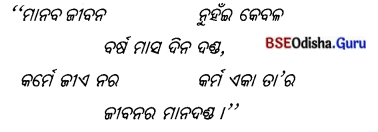
ସାର୍ବଜନୀନ ମାନବିକ ଆବେଦନ ଭିତରେ ଗୋପବନ୍ଧୁଙ୍କର ପ୍ରତ୍ୟେକ କବିତା ଜାତୀୟତାର ମନ୍ତ୍ରରେ ଦୀକ୍ଷିତ । ‘ଅବକାଶ ଚିନ୍ତା’ଠାରୁ ‘ଗୋ-ମାହାତ୍ମ୍ୟ’ ପର୍ଯ୍ୟନ୍ତ, ପୁଣି ଧର୍ମପଦ’, ‘ବନ୍ଦୀର ଆତ୍ମକଥା’, ‘କାରାକବିତା’, ‘ନଚିକେତା ଉପାଖ୍ୟାନ’ ପ୍ରତ୍ୟେକ କୃତିରେ କବିଙ୍କର ଅସାମାନ୍ୟ ବ୍ୟକ୍ତିତ୍ଵ ଫୁଟିଉଠିବା ସଙ୍ଗେ ସଙ୍ଗେ ଏକ ଅନନ୍ତବାଣୀ ଭିତରେ ଏହା ଯେମିତି ମର୍ମରିତ ହେଉଥିବା ଭଳି ଜଣାଯାଏ ।
(ଖ) କବିତାର ପୃଷ୍ଠଭୂମି :
ଗାନ୍ଧୀଙ୍କର ବାର୍ତ୍ତାକୁ ଓଡ଼ିଶାରେ ପରିପ୍ରଚାର କରି, ଆଇନ ଅମାନ୍ୟ ଆନ୍ଦୋଳନରେ ଯୋଗଦେଇ ଉତ୍କଳମଣି ଗୋପବନ୍ଧୁ ଦାସ ଇଂରେଜ ସରକାରଙ୍କଦ୍ବାରା ଗିରଫ ହୋଇ କାରାବରଣ କରିଥିଲେ । ସେ କଟକ ଓ ହଜାରିବାଗ୍ ଜେଲ୍ରେ ଥିବା ସମୟରେ କେତେଗୁଡ଼ିଏ କବିତା ରଚନା କରିଥିଲେ । କବିଙ୍କ ପରଲୋକ ହେବାପରେ, ସମାଜର ଗୋପବନ୍ଧୁ ଶ୍ରାଦ୍ଧ ସଂଖ୍ୟାମାନଙ୍କରେ କବିତାଗୁଡ଼ିକ ପ୍ରକାଶ ପାଇଥିଲା । ସେହି କବିତାଗୁଡ଼ିକର ନାମ ଥିଲା ‘କାରାକବିତା’ ।
ରାଜବନ୍ଦୀ ଭାବରେ ଗୋପବନ୍ଧୁ ବନ୍ଦୀଶାଳାରେ ରହିଥିଲେ । ସେ ଜୀବନରେ ମହାତ୍ମା ଗାନ୍ଧିଙ୍କର ଆଦର୍ଶ ଗ୍ରହଣକରି ତାଙ୍କ ତ୍ୟାଗପୂତ ପଥରେ ବ୍ରତୀ ହୋଇଥିଲେ । କାରାବରଣର ବନ୍ଧନ ଓ ନିପୀଡ଼ନ ତାଙ୍କୁ ଯେଉଁ ଦୁଃଖ ଦେଇଥୁଲା, ତାହାରି ବିରୋଧରେ ସେ ସ୍ଵର ଉତ୍ତୋଳନ କରିଥିଲେ । ବନ୍ଦୀ ଜୀବନରେ ଉତ୍ତୀର୍ଣ୍ଣ ଅପରାହ୍ନରେ ସୂର୍ଯ୍ୟାସ୍ତର ରୂପଶୋଭାକୁ ଦେଖି କବି ବିମୋହିତ ହୋଇଥିଲେ । ସେହି ସମୟର ପ୍ରାକୃତିକ ପରିବର୍ତ୍ତନକୁ ସେ ଭାବାବେଗରେ ଦେଖିଥିଲେ । ପ୍ରିୟ ପରିଜନ ଓ ଉତ୍କଳର ଜନସାଧାରଣଙ୍କଠାରୁ ଅଲଗା ହୋଇ ରହିଥିବାରୁ, ତାଙ୍କ ମନରେ ଯେଉଁସବୁ ଭାବ ଜାଗ୍ରତ ହୋଇଥିଲା, ତାହାକୁ ସେ କବିତା ଆକାରରେ ପ୍ରକାଶ କରିଥିଲେ । କବି ମନରେ ଇଂରେଜ ସରକାରଙ୍କ ପ୍ରତି ପ୍ରକାରାନ୍ତରେ ବିରୁଦ୍ଧ ଭାବ ଜାଗ୍ରତ ହୋଇଥିଲା । ଉପରୋକ୍ତ ଭାବଧାରାର ପ୍ରତିରୂପ ହେଉଛି କବିଙ୍କର ‘ବନ୍ଦୀର ବିରହ ବ୍ୟଥା’ ।
(ଗ) କବିତାର ସାରକଥା :
ମଧୁର ବସନ୍ତ ସମୟ । ଯେଉଁ ସମୟରେ ଶୀତ ସରି ସରି ଆସିଥାଏ । ସୂର୍ଯ୍ୟଙ୍କର କିରଣ ସେତେଟା ଟାଣ ହୋଇନଥାଏ । ଦକ୍ଷିଣ ଦିଗରୁ ମୁଦ୍ରପବନ ବହି ମନକୁ ଆମୋଦିତ କରୁଥାଏ । ସେହିଭଳି ସମୟରେ, ଉତ୍ତୀର୍ଣ୍ଣ ଅପରାହ୍ନକୁ କବି ଗୋପବନ୍ଧୁ ଦେଖିଛନ୍ତି । ଲକ୍ଷ୍ୟ କରିଛନ୍ତି ଅସ୍ତଗାମୀ ସୂର୍ଯ୍ୟଙ୍କର ଅପରୂପ ଦୃଶ୍ୟକୁ । ଦିନ ଶେଷ ହୋଇ ଆସିବାରୁ, ସୂର୍ଯ୍ୟ ପଶ୍ଚିମାକାଶରେ ଲୁଚିଯିବାକୁ ବସିଛନ୍ତି । ସୂର୍ଯ୍ୟ ଲୁଚିଯିବା ପୂର୍ବରୁ ସତେଯେପରି ପ୍ରକୃତିର ବିଦାୟ ଆୟୋଜନ ଲାଗିଯାଇଛି । ଅସ୍ତଗାମୀ ସୂର୍ଯ୍ୟଙ୍କର ରକ୍ତିମ ଆଭାରେ ସମଗ୍ର ଆକାଶ ନାନାରଙ୍ଗର ଚନ୍ଦ୍ରାତପରେ ସଜେଇ ହେଲାଭଳି ମନେହୋଇଛି । ଦିବସ ସରି ଆସିବାରୁ ପକ୍ଷୀମାନେ କଳରବ କରି ନିଜ ନିଜର ବସାକୁ ଫେରି ଯାଉଛନ୍ତି । କବି ପକ୍ଷୀମାନଙ୍କର ସେହି ଶବ୍ଦକୁ ବିଦାୟର କରୁଣାଗାନ ବୋଲି ଉଲ୍ଲେଖ କରିଛନ୍ତି । ସେହିପରି ସୂର୍ଯ୍ୟ ପଶ୍ଚିମାଚଳକୁ ଗତି କରିବାରୁ ତରୁ ଓ ପର୍ବତର ଛାୟା ବଢ଼ିଯାଇଥାଏ, ଯାହାକୁ କବି ସେମାନେ ପ୍ରଣାମ କରୁଥା’ନ୍ତି ବୋଲି ପରିକଳ୍ପନା କରିଛନ୍ତି । ପୁନଶ୍ଚ ସୂର୍ଯ୍ୟଙ୍କର ସୃଶ୍ଚିମ କିରଣ ବୃକ୍ଷ ଓ ପର୍ବତର ଉପରିଭାଗରେ ଦେଖାଯାଉଥାଏ । କବି ସେହି ଦୃଶ୍ୟକୁ ଦେଖି ମନେକରିଛନ୍ତି, ସୂର୍ଯ୍ୟ ଯେପରି ସେମାନଙ୍କ ମସ୍ତକରେ ସୁନାରଙ୍ଗର ପାଟ ବାନ୍ଧିଦେଇଛନ୍ତି । ଅନୁରକ୍ତ ଭୃତ୍ୟକୁ ସମ୍ମାନିତ କରିବାପାଇଁ ରାଜା ମହାରାଜା ପାଟଶାଢ଼ୀ ବାନ୍ଧିଲା ପରି, ସୂର୍ଯ୍ୟରୂପୀ ମହାରାଜା ବା ସମ୍ରାଟ ବୃକ୍ଷ ଓ ପର୍ବତରୂପୀ ଭୃତ୍ୟଙ୍କୁ ସୂର୍ଯ୍ୟକିରଣ ରୂପୀ ପାଟଶାଢ଼ି ବାନ୍ଧି ଦେଇଛନ୍ତି ବୋଲି କବି ବିଚାର କରିଛନ୍ତି ।
ପଶ୍ଚିମାକାଶର ପର୍ବତର ଉପରିଭାଗରେ ଅସ୍ତଗାମୀ ସୂର୍ଯ୍ୟ ହସିଉଠିଲା ଭଳି ମନେ ହେଉଥା’ନ୍ତି । ସୂର୍ଯ୍ୟ ପ୍ରାଚୀ ଗଗନର ବଦନକୁ ଅତି ସ୍ନେହରେ ରଞ୍ଜିତ କରିଛନ୍ତି ବୋଲି କବି ବିଚାର କରିଛନ୍ତି । ଆହୁରି ମଧ୍ୟ ସୂର୍ଯ୍ୟଦେବ ତାଙ୍କର କୋମଳ ସ୍ପଶ୍ଚିମ କିରଣରେ କୋମଳ ଆଶ୍ଵାସନା କରି ସ୍ନେହ ଆଦରକଲା ଭଳି ଭାବ ପ୍ରକାଶ କରିଛନ୍ତି । ବିଦାୟବେଳାରେ ମୁଦୁସମୀରଣର ଅସ୍ପଷ୍ଟ ସ୍ବରରେ ‘ପୁଣି ଫେରି ଆସିବି’ ବୋଲି ସୂର୍ଯ୍ୟଦେବ ପ୍ରବୋଧନା ଦେଇଛନ୍ତି । ଅଳ୍ପ ସମୟରେ ପୁଣି ଫେରି ଆସିବି ବୋଲି ଆକାଶକୁ ଆଶ୍ୱାସନା ଦେଇଛନ୍ତି । ସ୍ନେହଭାବରେ ପ୍ରାଚୀର କପୋଳ ପ୍ରଦେଶ ରକ୍ତିମ ହେଲେବି, ତା’ମଧ୍ୟରେ ବିରହ-ଦୁଃଖର କାଳିମା ଦୋଳାୟମାନ ହୋଇଛି । ସୂର୍ଯ୍ୟ ନାଚି ନାଚି ହସି ହସି ଅସ୍ତ ହୋଇଗଲେ ବି ତାଙ୍କ ମୁଖରେ ଦେଖାଦେଇଛି, ଅଧୁକ ଭାବରେ ବିଷାଦଭାବ । ସେହି ଦୃଶ୍ୟକୁ ଦେଖି ମନେ କରିଛନ୍ତି, କେବଳ ଯିଏ ଅନୁଭବୀ, ସେହି କେବଳ ଅନୁରୂପ ଦୃଶ୍ୟକୁ ହିଁ ଅନୁଭବ କରିପାରିବ । ପ୍ରିୟଜନ ବିରହରେ କିପରି ଅତିଶୟ ଦୁଃଖ ହୋଇଥାଏ, ତାହା ଜାଣିପାରିବ । କାରଣ ପ୍ରୀତି ସୂତ୍ରରେ ବା ପ୍ରେମବନ୍ଧନରେ ସମଗ୍ର ଜଗତର ଜଡ଼ ଓ ଚେତନ ପରସ୍ପର ବାନ୍ଧିହୋଇ ରହିଛନ୍ତି ।
ଅସ୍ତଗାମୀ ସୂର୍ଯ୍ୟଙ୍କର କିରଣକୁ ନେଇ ପ୍ରକୃତିର ପରିବର୍ତ୍ତନକୁ ବିଦାୟବେଳାର ବିରହ ମୁହୂର୍ତ୍ତ ଭାବରେ କବି ପରିକଳ୍ପନା କରିଛିନ୍ତି । ମନରେ ତାହା ଅଧିକ ପ୍ରଭାବ ବିସ୍ତାର କରିଛି । ଅତୀତର ଅନେକ ମୁହୂର୍ତ୍ତ କବିଙ୍କ ମନକୁ ଆହୁରି ବେଦନାକ୍ତ କରିଛି ।
ସନ୍ଧ୍ୟା ସମୟ ଉପଗତ ହେବାରୁ, ନିୟମ ଅନୁସାରେ ତାଙ୍କୁ ପୁଣି ତାଙ୍କର କୋଠରିକୁ ଫେରିଯିବାକୁ ପଡ଼ିବ । କାରାଗାରର ସିପାହୀ ତାଲା ପକାଇବାକୁ ଆସିବାରୁ, ସେ ତାହାକୁ ଅନୁରୋଧ କରିଛନ୍ତି, ଆଉକିଛି ସମୟ ରହିବାପାଇଁ । କାରଣ ସନ୍ଧ୍ୟା ଆଗତ ଦୃଶ୍ୟକୁ ସେ ଆହୁରି ପ୍ରାଣଭରି ଉପଭୋଗ କରିବାକୁ ଚାହିଁଛନ୍ତି । ଦିବସର ଅବସାନରେ ଭୂ-ଭାଗ କିପରି ଦୁଃଖପ୍ରକାଶ କରିଛି, ସୂର୍ଯ୍ୟଙ୍କୁ ବିଦାୟଦେଇ କିପରି ବିରହର ବ୍ୟଥା ଅନୁଭବ କରିଛି, ତାହାକୁ ମନଭରି ଦେଖିବାପାଇଁ ସେ ଇଚ୍ଛା କରିଛନ୍ତି ।
ସୁଖ ପାଖରେ ଦୁଃଖ ରହିଲାପରି ପ୍ରଣୟରୂପକ ପୀୟୂଷରେ ବିରହରୂପକ ବିଷ କାହିଁକି ରହିଥାଏ ବୋଲି, ସୃଷ୍ଟିର ଏ ବିଚିତ୍ର ନିୟମକୁ କବି ମନେ ମନେ ବିଚାର କରିଛନ୍ତି । ବିଶ୍ୱବାସୀଙ୍କ ପ୍ରତି ସୃଷ୍ଟିକର୍ତ୍ତାଙ୍କର ଏଭଳି ବିରୋଧମୂଳକ ନିୟମକୁ ଦେଖି ସେ ମନକୁ ମନ ପ୍ରଶ୍ନ କରିଛନ୍ତି । ଏହି ନିୟମକୁ ଆହୁରି ସ୍ପଷ୍ଟ କରିବାପାଇଁ କବି କହିଛନ୍ତି, ମନଲୋଭାକର ପଦ୍ମ ମୂଳରେ ବିଷଧର ସର୍ପ ଯୋଡ଼ିହୋଇ ରହିଥାଏ । ସୃଷ୍ଟିରେ ଏହି ବିପରୀତ ସ୍ଥିତିକୁ କେହି ଆକଳନ କରିପାରିବେ ନାହିଁ ।
କବି ଗୋପବନ୍ଧୁ ସେହି ଅବସରରେ ନିଜର ବିରହବିଧୂର ଭାବକୁ ପରିପ୍ରକାଶ କରିଛନ୍ତି । କାରଣ ନିଜର ପ୍ରିୟ ପରିଜନ ଓ ଆପଣାର ପରିଚିତ ପରିସରକୁ ସେ ଛାଡ଼ି ଆସିଛନ୍ତି । ସେହି ପରିଜନଙ୍କ ସ୍ମୃତିକୁ ଦୋହରାଇ ସ୍ମରଣ କରିଛନ୍ତି । ବନ୍ଦୀଭାବରେ ରହିଥିବାରୁ ବିରହର ବିଷମ ଜ୍ଵାଳା ବିଷସଦୃଶ ତାଙ୍କର ପ୍ରାଣକୁ ଆନ୍ଦୋଳିତ କରିଛି । ସେ ପୁଣି ସୂର୍ଯ୍ୟସ୍ତ କାଳୀନ ବିରହଦୃଶ୍ୟକୁ ଦରଦୀଭାବ ନେଇ ପ୍ରକାଶ କରିଛନ୍ତି । ତାଙ୍କ ହୃଦୟରେ ବିରହବେଦନା ଗୁମୁରି ଉଠିଛି ।
ସେହି ସମୟରେ ବନ୍ଦୀଶାଳାର ସିପାହି ତାଙ୍କୁ କୋଠରିକୁ ଫେରିଯିବା ପାଇଁ କହିଛି । କବି ଗୋପବନ୍ଧୁ ସେହି ସିପାହିକୁ ଆଉ ଦଣ୍ଡେ ରହିବାକୁ କହିଛନ୍ତି । କାରଣ ସେ ପର୍ଯ୍ୟନ୍ତ ଅବରୋଧ କକ୍ଷକୁ ଯିବାର ସମୟ ହୋଇନାହିଁ । ବେଳ ରତ ରତ ହେଉଛି । ସୂର୍ଯ୍ୟ ସମ୍ପୂର୍ଣ୍ଣ ଅସ୍ତଯାଇ ନାହାଁନ୍ତି । ସେହି କାରା ପ୍ରାଙ୍ଗଣରେ ଆଉ ଟିକିଏ ବୁଲାବୁଲି କରିବାକୁ ସେ ଇଚ୍ଛା କରିଛନ୍ତି । ମାତ୍ର କବିଙ୍କର କୌଣସି ଅନୁରୋଧକୁ ସିପାହି ଶୁଣିନାହିଁ । ତେଣୁ ସେ ନିଜକୁ ନିଜେ ବୁଝାଇ କହିଛନ୍ତି, ଯମଦୂତ ଭଳି ସିପାହି ମନରେ ସାମାନ୍ୟ ଦୟାଭାବ କିପରି ଆସିବ ? ଆଉ ଅଧିକ କିଛି ସିପାହିକୁ ନକହି, ନିଜର ମର୍ଯ୍ୟାଦା ରକ୍ଷାକରି କୋଠରିକୁ ସେ ଫେରିଯାଇଛନ୍ତି ।
(ଘ) କଠିନ ଶବ୍ଦ ଓ ଏହାର ଅର୍ଥ:
- ମଧୁର – ମିଠା (ଅଧ୍ଵ ଥଣ୍ଡା ବା ଅଧିକ ଗରମ ନ ଥୁବା ସମୟ, ଯାହାକି ମନରେ ପୁଲକ ଭାବ ଆଣେ)
- ତପନ – ସୂର୍ଯ୍ୟ
- ଚନ୍ଦ୍ର ଆତପେ – ଚନ୍ଦ୍ରାତପେ / ଚାନ୍ଦୁଆ
- ଅମ୍ବର – ଆକାଶ
- ତରୁ – ଗଛ / ବୃକ୍ଷ
- ଗିରି – ପର୍ବତ
- ହେମବରଣୀ – ସୁନାରଙ୍ଗର
- ଭୃତ୍ୟ – ସେବକ
- ଅସ୍ତାଚଳ – ସୂର୍ଯ୍ୟ ଅସ୍ତ ହେଉଥିବା ପର୍ବତ
- ରବି – ସୂର୍ଯ୍ୟ
- ପ୍ରାଚୀ – ପଶ୍ଚିମ
- ଅନୁରାଗ – ସ୍ନେହ
- ଚାରୁ – ସୁନ୍ଦର
- ବଦନ – ମୁହଁ
- ସ୍ନିଗ୍ଧ – କୋମଳ
- କନକ କର – ସୁନାର କିରଣ
- ସମୀରଣ – ପବନ
- ଗିର – କଥା
- ଲାସ୍ୟହାସ୍ୟ – ନୃତ୍ୟ ଓ ହସରେ
- ପ୍ରକଟେ – ପ୍ରକାଶ ପାଏ
- ଗୁରୁ – ଅଧିକ
- ଜଡ଼ ଚେତନ – ଜଡ଼ ଓ ଜୀବ
- ପୀୟୂଷ – ଅମୃତ
- ବିଧ୍ – ସୃଷ୍ଟିକର୍ତ୍ତା
- ସରୋଜ – ପଦ୍ମ
- ଅହି – ସର୍ପ
- ସିପାହି – ଜେଲ୍ର ଗାର୍ଡ଼
- ଗୋଧୂଳିକାଳ – ସନ୍ଧ୍ୟା ସମୟ




